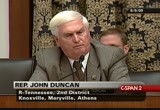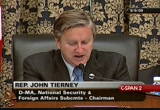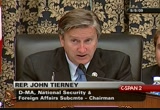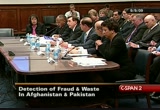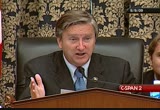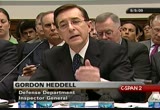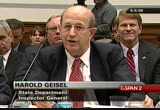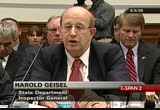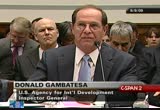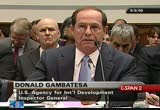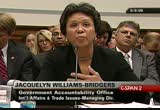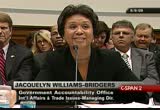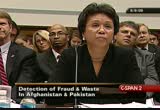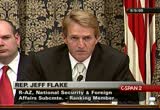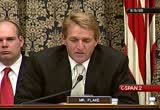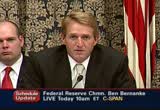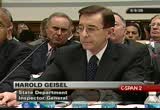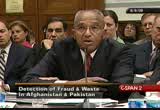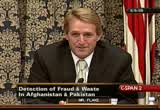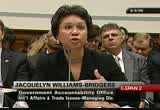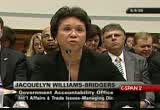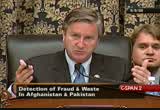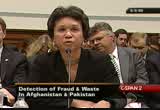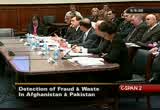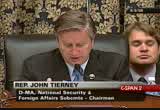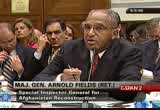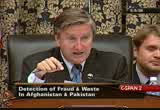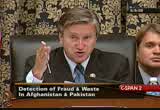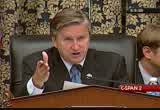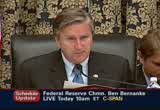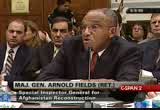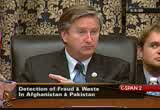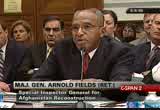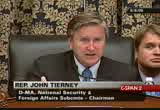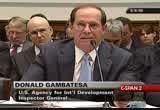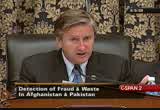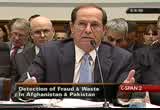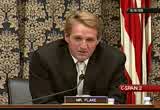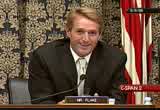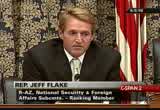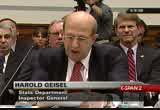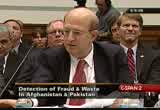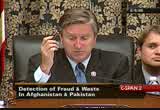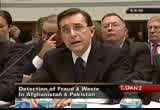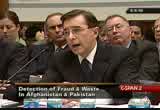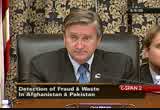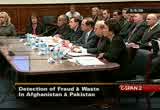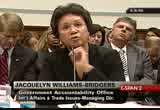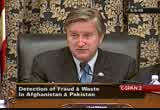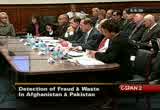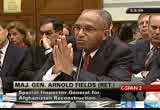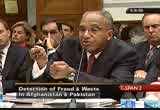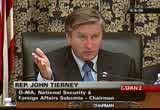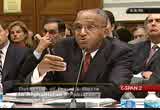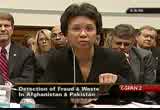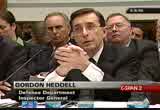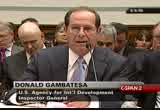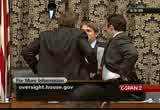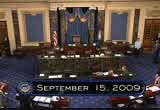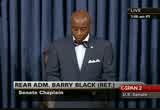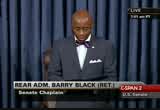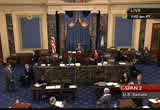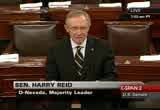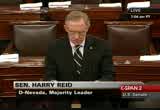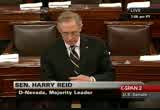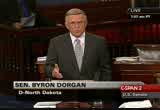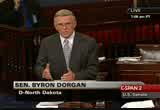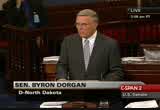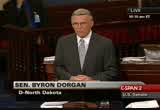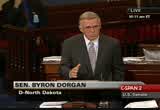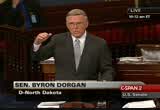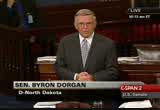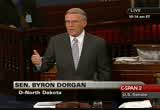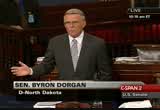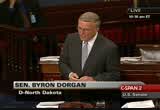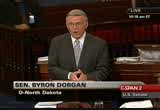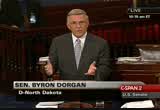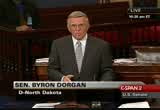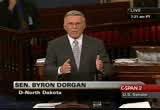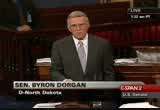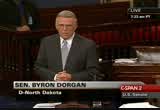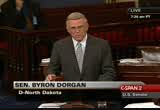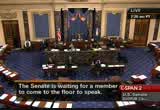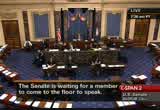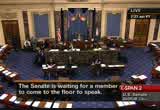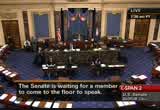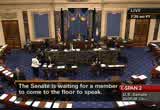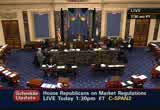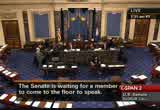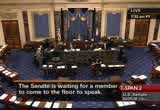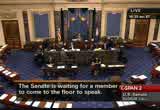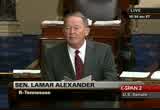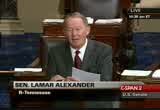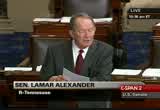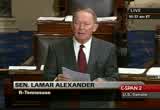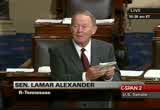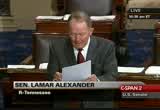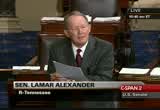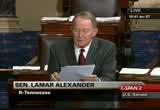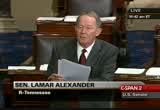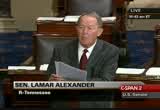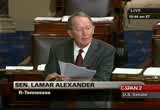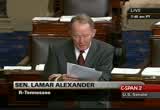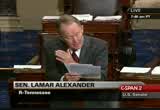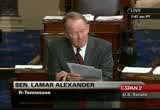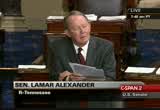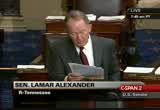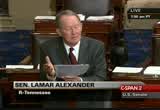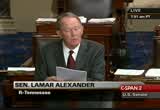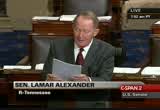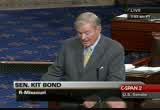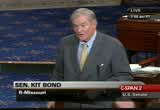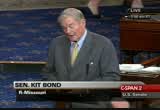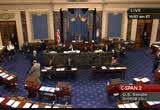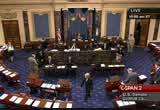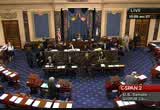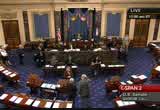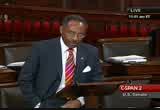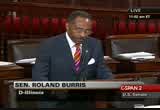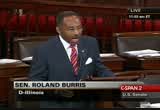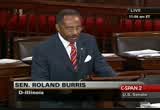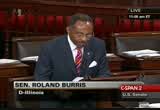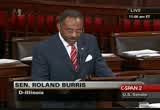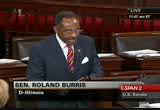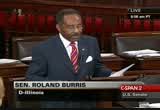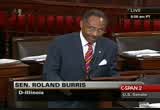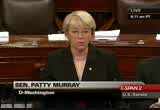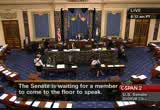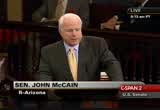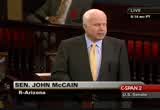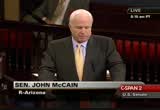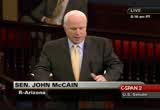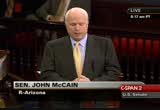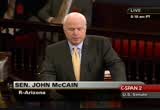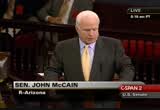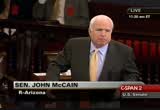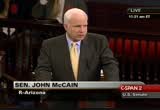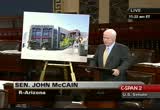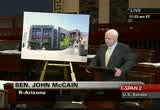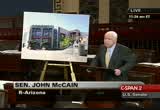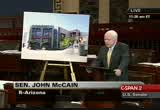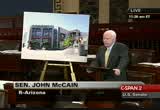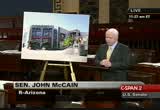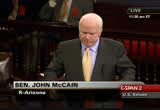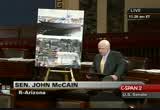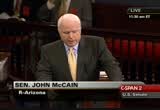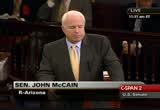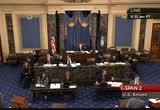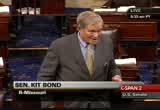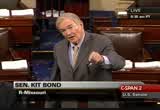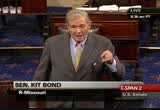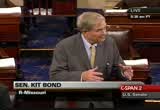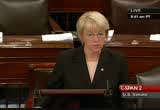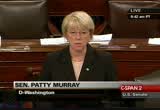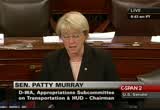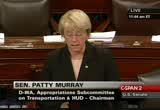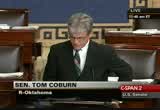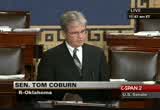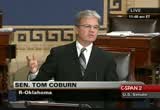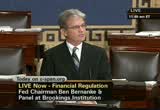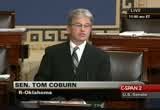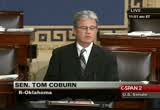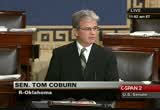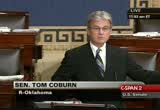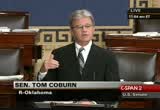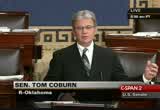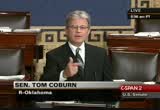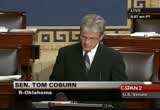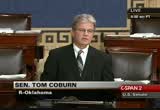tv U.S. Senate CSPAN September 15, 2009 9:00am-12:00pm EDT
9:00 am
believe you will be 10 or 15 years, if that long, that we are not able to pay all of our social security and veterans pensions and all those things we have promised our own people. so i wish all these witnesses well, and i commend you, mr. chairman, for holding this hearing. but i think we need to realize that we can't afford to do and what we are doing in afghanistan and pakistan, and keep expanding our mission, increasing our spending over there. we're going to increase our troops by the end of the year to 68000, and in all these areas where having more civilian contractors than the our military troops. at some point we have got to come to our senses and realized we just simply can't no longer afford this. thank you. . .
9:01 am
9:02 am
corruption, but also a practice of corruption and corruption being embedded in the official representatives that are being put in the government of afghanistan and we have other situations over in pakistan. so how are you going to proceed? how are we going to proceed and what are the resources we're going to apply to that in and i would suspect that we're going to do something about trying to put in place standards and processes before we start spending the money hopefully. particularly, in areas like fatwa, northwest other province, difficult areas to go into, so has there been consideration about not just spending the money before processes are in place, and if there are those kinds of considerations, would you tell us what they are and how they're expecting to implement them. i know that mr. hadell mentioned a lot of this is educational preventive, so i'm hoping that you're out there on the ground ahead of time, saying to all of the people that are going to get the money, here's advice from us
9:03 am
ahead of time, before we come in and audit you and investigate you and go on that end, here's what you can do to avoid a bad audit and a bad investigation and here's what we're going to look to -- have in place systems and processes and then hopefully we're not going to start spreading out the money until we're satisfied from reports of all you people that those things are in place. would somebody like to respond to that? mr. hadell, do you want to start? >> >> i think you might have to move it a little closer. >> ok. >> mr. skwrao: the oversight community >> the oversight community is not the one spending the money, but we're trying to identify where it's going and with it's going properly and being spent the right way. >> that's clear. >> in 2008, 2008, we issued what we call a summary report, included 302 reports and
9:04 am
testimonies of not only the d.o.d. inspector general, but the military audit services, the navy, the air force, the army, special inspector general for high rack, and gao, an we -- we look at 302 reports, we issued over 970 recommendations, so we're following up on every one of those. >> i was just going to ask you that. that's a lot of recommendations, not doing anybody a hill of beans worth of good unless somebody is drilling down and making sure they're happening. >> yes, sir. i apologize for interrupting you. we are keeping, we're tracking this, 70% to 80% of those 900 plus recommendations are being addressed by the department of defense. and many of them have been resolved. so there is ago, but action only occurs when there's followup and that's one of our most important programs is to follow up, and i would give this for the record -- >> we have a copy.
9:05 am
moves us have read it, but we're happy to have it again if you'd like. that's the idea of following up on recommendations made and i think that's essential, but i'm also talking here about a little bit of preventive action, trying to get people to know, what's the right course before you have get down the path on that. >> i would offer another one. preventive. we learned in iraq that electrical systems, this may sound fundamental, but electrical systems are deficiency. americans died. needlessly. and those lessons are learned and being transferred to afghanistan. >> i understand and that's great in those case by case, but i'm talking about a broader strategic path here. we're going to have people spending money in remote areas of afghanistan, and the first problem is do they have in place processes or standards that they know they have to meet on that and the second thing is, if we can't physically get there ourselves, what do we have in place to do that? ambassador, do you want to take
9:06 am
a stab at that? >> i'll let my colleague from youth aid do most of talking, but there's two points i would like to make. the first is my staff has been kind enough to explain to me how, afpac became fpac and the answer was it was ambassador holbrooke who started using pacf. actually, the point that you made about trying to get ahead of the curve is exactly what i think this community is trying to do in pakistan. and for that matter, why i think you're holding this hearing, if i may be so bowl. >> a large part of it. that's why i wanted to get to it. >> and we are working with the embassy, our inspectors will work with them, our auditors will work with them, raising these various points. for instance, as you mentioned, and as we all know, all too well, it is going to be very, very difficult to work in the
9:07 am
fatah, and we are working world trade center obama necessary rather imaginative ways to consider how we are going to perform oversight in what is a very challenging area and at least we have the sad experiences in iraq and in afghanistan to guide us. >> now, we're talking about a billion and a half dollars over five years, a serious amount of money. i think this committee should want some comfort that before that money is disbursed that these things are in place, and so i ask again, is there some mechanism, whether it's a trust account or somewhere that that money is going to reside until we're secure in the notion that it's not going to be distributed until there's something in place that gives us reasonable comfort that it's going to be spent wisely. >> if my colleague will let him,
9:08 am
since he's got most of the money, i'll -- >> all right. i'll get back to you on that. >> he has most of the money, but not enough staff. i'll tell you that one thing and then we'll get to that in a little bit here to. too. >> earlier i mentioned that basically in the audit world, we follow the money and our investigations, although primarily active beings we do a lot of fraud awareness training around the world. and i don't have the stats, but we do hundreds of these training programs, where we provide training to not only u.s. navy person em, but representatives of contractors, subcontractors, and grantees. we have actually get out and show them what to look for in fraud, so i think in that proactive way, we do some of what you're looking for. >> but then we're left with the problem of overseeing the contractors and subcontractors, whatever, because we've lost so much of our in-house capacity, we sometimes don't even have enough, in your department alone to manage and oversee those
9:09 am
contracts. >> well, i think, i'm not speaking for u.s.-aid, historically an many of our audits have shown that many of the problems they face, especially in contract areas is lack of staff, lack of trained staff and lack of people willing to go to those places to work. now, the agency is in the process of building their staff, and hopefully that will help, but certainly, in the past, they've had a -- a problem in that area. >> ms. williams-rodgers. >> thank you, mr. chairman. there are a couple of things, i believe, that can be done if a preventive mode, to ensure that our money is well spent hand in large part, it requires the help of the congress. there was mention early on of discussions of looking at alternatives, such as direct budgetary support i believe for
9:10 am
afghanistan. i have not seen his letter, but i look forward to reading t but what we have clearly learned in the past, while these type of efforts, direct cash transfers or direct budge tarry support -- budgetary support are good in intention and often result if very good outcomes, because presumably, they are consistent, they allow there to be some consistency and anticipation and planning for what the needs are of the country that we are looking to serve. oftentimes in the past, we found that the moneys that we have spent have not been consistent with the national needs or priorities and therefore, there has been a lost opportunity to really make big gains. but any direct budgetary support must come with the ability of the accountability community to access the records and the backup documentation that is kept there, so that we can exercise some control and oversight, as well as the host country government can have some accountable system, some data that they can really upon to
9:11 am
ensure that the moneys are accounted for and well spent. we've learned well in the past in our other investment efforts in countries, where there is no such access, that we have no ability to track and account for our investment made there. second, i would also ask that congress assistance and support in ensuring that in -- with agencies respond to our recommendations, g.a.o.'s recommendations in particular, there's a requirement if law that the agencies respond within 60 days to the congress, informing them how they intend to act on the recommendations, that they've often agreed with before we've issued our reports, we incorporate whether or not the agencies agree or disagree. as is often the case in transitions in government, the agencies aren't aware of this requirement, and so most recently, in dealing with some of our agencies that we are dealing with at this table, we have found that those letters are just piling up. in someone's room, and not
9:12 am
knowing where they should go, or they haven't been prepared at all, so we will be glad to work with the congress to try to reinforce on some of these mechanisms to ensure not only responsiveness to past recommendations that will prevent misspending and fraud and abuse in the future, but also to ensure that there is access and accountability over any new investment that's made, given any new direction that might be pursued. >> i'll get back to this again, i want to give mr. flake an opportunity to be heard. mr. flake? thank you. >> to followup on that, very quickly. obviously, the government of afghanistan wants budgetary support, all governments do, and you're telling us that you'll make the recommendation or you have made of the recommendation that that not be the case until we can access records that we clearly can't access right now. is that the case? it's your -- it's your contention that we wouldn't unable to have access to how the money is being spent, even though we pretty much know,
9:13 am
that's not a direction that certainly i want to go here. >> we have not made the recommendation, because i have not yet seen this proposal and i don't know what stage this proposal is in. but given our past experience with direct budgetary support provisions. >> right. thank you. >> you testified that you have may have had 84 recommendations for operational improvement to u.s.-aid programs. how many of these recommendations have been implemented? >> i don't have the exact number, but generally, we get management decision on the majority of them, and i'd have to get back to you on the exact number. i don't have that number right here with me. >> you said, generally you get -- >> generally, we get management concurrence on the recommendations we make. they don't object. i'm not aware of any of these where we've had an objection that we're not going to do what we recommend and whether they've actually gone through and
9:14 am
completed the recommendation, i'd have to get back to you on that. i don't have that right here. >> when were the recommendations made, how long ago? >> the information i was given was over a four or five year period, so it's over that span. >> ok. over that span, and -- so your anticipation is that most of them have been implemented? >> i would hope they have been, but i can check and get back to you. >> can you get back to us on that? >> sure. >> typically, if they don't follow through and make the recommendations, what happens? who do you then go to and say hey, you're not make the improvements, not following our recommendations and at what point is congress informed? is it through this regular process or is it -- is there a trigger that forces you to come back to us and say, hey, these programs ought to be shelved because they aren't following our recommendations? >> there is in fact a process
9:15 am
within the inc. -- inspector general's act that requires us to notify congress if recommendations aren't acted upon within a six months period. >> when was the last time you notified congress? >> we have never had to. well, in my tenure, we have not had to. >> does that go for everyone here, for the other agencies? state? ambassador geisel, have you had the experience where you've had to come to congress? >> i'm informed that we actually had to report two instances of non-compliance to the congress. >> that was with regard to afghanistan or -- >> no, sir. >> no. >> so what we're hearing so far, is every recommendation made with regard to afghanistan has implemented. does that go also for defense? >> mr. flake, i've been if the -- at the department of
9:16 am
defense for about 14 months now. during my time, i don't know of any instance where we have exercised that requirement. however, we do issue semiannual reports to the congress. in these reports are a list of recommendations in a broad sense, so we do keep the congress fully apprised of what we have found, what we are doing, and what we're monitoring. >> all right. >> general fields, did you have a comment, sir? >> thank you, sir. i wish to comment on the followup to recommendations. our first report if my capacity, given we are a new organization, we issued several months ago, it was a report on $404 million of afghanistan security forces fund, administered by sistkr and
9:17 am
we discovered that there was insufficient oversight of that arrangement. funding the execution of it, principally, the contract oversight person was located in maryland, rather than in afghanistan, where the money is being executed. we are pleased to report that as soon as we made this observation, to u.s. forces afghanistan, they began to address it. that included followup work by the secretary of defense, and other oversight entities. so from that standpoint, speaking exclusively there has been a response to at least that report. there are several other reports that we have issued, but too early for immediate response to be reported to this subcommittee today. >> thank you. second followup question. ms. williams-bridges, you mentioned and all of you have mentioned security situation makes it difficult for you to carry out your work in
9:18 am
afghanistan. at what point, for a committee like ours, where do we draw the line and say, security situation is such, so we can't carry out our oversight functions, or security situation is so bad that perhaps we shouldn't be spending this money because we can't account for all of it. where do we draw that line and i know it's a difficult situation, all of us have traveled to afghanistan and we recognize that you can only have field offices or personnel in certain areas, and it's a real endeavor to go out and particularly in some of the areas we've been talking about, but how -- how are we to navigate that line i guess, between security situations, so difficult that we can't provide oversight, or perhaps is it so bad that we simply shouldn't be spending these moneys in these areas, because we can't account for them? >> good question. i'm glad to say that i don't believe we've reached that point
9:19 am
yet, where the security situation is so bad that we believe that we cannot provide the congress with meaningful information to help you conduct oversight over our engagement in country. i think that we -- and we would inform you, if we believe that were a limitation to our ability to hanes the mail, if you will. i think that we have to take mitigating strategies. we have to mitigate against the limitations that may be imposed on our ability to actually make field visits. for example, when i was in pakistan a couple of months ago, we wanted to go to the fatah, we wanted to go to see some of the projects that the u.s. government had funded. we were not able to. however, we were able to extract enough data that we felt was sufficiently reliable from the agencies, to be able to conduct our work, and to be able to analyze it to make some reasonable judgments as to whether or not there was good record keeping, whether or not we were on track with plans that
9:20 am
we had made in country. but there are a couple of lessons that have been learned, and actually, these lessons form the basis for military counterinsurgency doctrine. first is to establish security. first and foremost. establish security. before you proceed with reconstruction. we've learned this from iraq, we've learned very hard lessons from iraq, of investment, that has been destroyed. our investment in infrastructure that was destroyed, because the security was such an unstable situation. second is to create an economic foundation in that country that they can sustain the investment that we have made in country. again, this goes back to what kinds of strat gives do we need to think about going forward as we look to increase our investment there. third is to extract the political commitment from the country that they are going to carry out those priorities that they've established, priorities that we join in with the country, and create the basis for our own strategic goals if that country.
9:21 am
so i think we need to think of that as we move forward with any future investment and certainly, things are things that we are going to continue to monitor in our own oversight strategy to ensure that that investment is well made and protect. >> i guess the trick here is not to put the cart in front of the horse, which i think billions of dollars in is being done. i think most notably of the coalition support funds if pakistan, where we were there and investigating whatever, we found $6.7 billion spent in large part, which was not accounted for at all. and part of what happened was the money was basically paid to pakistan, went into the general treasury, and at that, you were at the mercy of either believing or not believing what was going on, but i do believe we looked at 35 helicopters, money that was paid supposedly to have them repaired and they're all sitting out on the ramp unable to move so that's the kind of thing that we're talking about here that we need to get out in front of this
9:22 am
on that situation and as the inspector -- special inspector general says, the current situation in afghanistan is such that it's not conducive to building or repairing, nor is it conducive to developing afghan's capacity to even hold elections that we're seeing, or provide justice or to meet the basic needs of the afghan people, so are we going to throw money into the development side of that without resolving those issues first and we seem to be doing with the right motivations and moving forward, but it's hard to do that. in pakistan, in particular, i know that you were out there and we've been out there as well in the fatah and northwest province area, i'd like to know a little bit about how it is that you have so much faith that we're able to do it. i have know the foreign assistance in fatah, according to the special inspector being accomplished with the use of non-u.s. implementors. basically, we're contracting it out or we're going to locals, but we were there, you know, we couldn't get much further out into the shower and people there
9:23 am
told us, non-governmental organizations told us, our own consulate told us, they couldn't gotti where near where the projects were happening, whether it was an irrigation project, a well, a school, an so they were trying to use flights, overevidence flights, the word-of-mouth from other people out there. how reliable is that? >> let me clarify. we heard the same thing when we were on the ground, as we met with local nationals, as we met with agency officials, we met with the secretariat of the fatah. we were developing our development assistance in the fatah area. we have not reached conclusion yet. but we were able to get data that we believe we can rely on from the agencies to be able to conduct our analysis, so we have not yet reached our conclusions. >> i would like to see your report and the foundation for your reaching that conclusion, you know, on that. i think it's an important matter
9:24 am
here, $1.5 billion heading in that direction, you know, we want to make sure it isn't going in the wrong direction on that. the combined security transition command in afghanistan, that is a serious matter, we had all of those weapons with the potential that they might not be accounted for. is there followup going on for that? >> we have done accountability in high rack and afghanistan, -- iraq and afghanistan, we did find that there were concerns. we've also found that there have been connections made with respect to those in high rack. we are get -- iraq. >> i don't mean on jules the afghanistan cstca. >> we went to afghanistan last fall, we took a look at weapons accountability, as well as training and equipment sustainment. >> so we had several supports on that, which is why i raised the question, we wept -- went out
9:25 am
there and visited as well and we were convinced that not enough was being done. >> we have followup work planned, several things that will be in motion between now and next spring, yes, sir. >> thank you. now, special inspector, i have a question for you about your part of the report indicating that obviously, we're aware of salaries going to ghost employees in the security divisions of afghanistan, and i think you're following up on that. but we also have a report in your written remarks, about some private firms that are spending, you know, international moneys or whatever, hiring security people that may in fact be connected to the taliban. now my question to you is, which flavor of taliban, are they hiring on that basis, you know, and just what is their -- who are they, that particular group of taliban, and is that a dangerous thing for them to be doing that, is there something being done about it, if it is,
9:26 am
could you elucidate on that? >> thank you, mr. chairman. our work in this particular area is not complete at this time. but this is a serious matter, at least to look at in terms of determining if there is wrongdoing, and if in fact the allegations that we have seen, especially over the past few days, are in fact valid, but i'm not prepared, mr. chairman, at this time, to report any of the results, but i'd just wish though to inform that these are matters that we are looking into. >> when will you think that you have some results on that particular inquiry? >> sir, i would suggest perhaps within the next -- within the next month. >> i think the sooner the better. it's rather alarming concept that could be looked at there, if it's taliban that are then turning around and focusing on our troops, international troops, and against the afghan government, then certainly we've got a major problem. if they're a different breed of
9:27 am
taliban, we have to foe about that as well, so i urge you to move on that as quickly as you can. >> thank you, mr. chairman. >> mr. flake, do you have any questions? >> you're good. >> thank you. i'm particularly concerned about the my training, and the army training as well, even more so about the police training there. and i would hope that that's something that somebody in this group is going to look at with depth. here we are, 2009, nearing the end, and there's the police training, there's corruption ram pants on there, there seems to be -- i know there's a great plan the department of state hasty about training some people and switching them in. i think if we go on that basis by the year 2030, we ought to have covered the country and be ready to start again, so that's the difficulty there. who is taking the lead on determining what the status of training the police in afghanistan is? >> we will be following up on our past work, looking at the
9:28 am
training and capabilities of the afghan national police. right now, we are focusing our attention on the army, but in the course of our followup work, and in future work, we will definitely pay attention to the security capabilities. >> we have a number of substantial witnesses before this committee, who are quite knowledgeable about counterinsurgency, and they're here to tell us that the police are every bit as important or more important than the military on that, so i would hope that we could at least do them simultaneously as opposed to stacking them military first and the other and we've seen our own visits over there and talks to different people over there that it's critical that that be done. if the local population doesn't have any confidence in the legitimacy of their police force, we're in a terrible state of affairs on trying to do any of the theories that we have on that, so other than the government accountability offi office, is cstca looking at that? >> thank you, mr. chairman. we know too well that of the 30 billion to which i made earlier reference that the united states has invested in the reconstruction in
9:29 am
afghanistan, over half or about half of that money, about $18 billion, really has gone towards the afghanistan national security forces. and a large body of our work is -- has been done, is ongoing, an will be done to address the significance of that element of funding for the reconstruction. >> the fear is this. all right. there's a large a. money that's gone toward that. that portion that was designated toward the security of the police, may not be an investment, may have been wasted on that. when you look at the state of affairs of the police in afghanistan, i'm hard pressed to call that an investment to date, so the idea would be to get a report as quickly as possible on that, as to what would turn that into an investment that would have positive results, because we don't do that. all the people we have over there, not just the military people, but all the people that worn for you, all the people that work in development, there's serious risk on that, so i appreciate that if you would
9:30 am
do that. >> mr. chairman, actually, state oig and dod-oig are undertaking a point study of police training right now, and our report should be ready, i believe, in december. >> well, thank you for that. should the -- how are we going to address all of our oversight issues in pakistan? >> sir, we have looked at this question, of course, well before this announced testimony, and we have dialogued with ambassador holbrooke on this and he made certain references to this issue, during his testimony in june. we, from the cgar standpoint support the idea of spending our
9:31 am
mandate to assist in covering pakistan. for one reason, the in extricable linkage between afghanistan and pakistan. if our mandate is similar to that which we currently have, which allows us to look across agencies, we think that's a considerable benefit. we believe also that in spite of our relatively meager numbers right now, we could almost immediately commence some degree of oversight, of spending if afghanistan and over a period of time, with increased funding, leading to increased numbers of auditors, inspectors, and investigators, build to a more substantial effort to address this matter. we underscore the significance of oversight, which in the case of afghanistan, may have started before cgar, but not at the time
9:32 am
at which we began to invest significantly in the reconstruction of afghanistan, so we would not like to see this happen in peacoats well. >> -- in pakistan as well. >> sir, i safe this, not to be a wise guy, but you're aware of some criticism of special inspector general's office in afghanistan. >> yes, sir. >> address that for me if you will. basically the criticism, there's a positivity of reports and they were comparing it to the number of reports that have come out of iraq in the comparable period at the outset of those offices. you have five reports i think over the course of your first year and i guess there were many, many more, in the iraq office on that, but given that criticism, if you address that and address, would there be enough personnel and enough capacity in the special inspector general's office in afghanistan to actually go over into pakistan, and might we not be better off trying to focus on some of our other agencies or another special inspector? >> yes, sir.
9:33 am
first, let me address the criticism aspect of this office. the criticism frankly, mr. chairman, is not unexpected. we were late in getting funding to support our effort. but this congress has now provided the funding, particularly as a part of the $7.2 million we received, which complemented the $16 million that we had previously been provided, that really has rounded us to hire on the people that we informed of the congress last year about this time. that we wanted to hire to get our work done, so we are -- we are hiring the right folks to do the job. we are not suggesting that we have excess capacity, but we are suggesting that it would be advantageous to the oversight community, if we were to link the oversight of pakistan with that of afghanistan and given our now almost full year of funded oversight work, we feel
9:34 am
that that's -- that perspective is a valid one. >> ok. the capacity of all of your offices, somewhat concerns me. government accountability office, not withstanding, they seem to be getting their people around. but i'm not sure, most stressing is u.s.-aid, the in-house capacity that your office used to have. you have 210 foreign service offices and civil service employees, what's the breakdown of that, how many are civil service employees and how many are foreign service officers? >> about 125 ballpark are foreign service. the rest of civil service. >> so they're covering hundreds of countries, becomes of dollars. >> correct. >> there was a day when your capacity was substantially higher than that? >> i don't have that knowledge. i don't know personally. i can ask one of my staff, but we are in the process of staffing up, i mean, our budget have been increased, we are getting the funding, i believe, we're in the process of trying
9:35 am
to hire another 20 auditors, and -- >> foreign offices? >> foreign service, mainly foreign service. >> are you having difficulty finding people that are qualified? >> not really. we've hired probably 20 in the last six months. many of them are very highly qualified. >> are you having difficulty finding people that are willing to go to afghanistan and pakistan? >> that's the issue. whether they wants to serve in those countries, i think that's the limiting factor, more so than their qualifications as auditors. >> of those 20, what percentage of those people were willing to go to afghanistan? >> at the all have to be. >> if they're foreign service officers, they have to be clearly medically, for example, to go to anywhere we have offices or where we work. >> if it weren't for the fact that you were inviting them to go to afghanistan and pakistan, how many of that 120 slots would you have filled, do you think? >> i don't think it would be much different. i think we're doing quite well,
9:36 am
but we certainly need to staff up. i did mention in my written statement that we -- if the funding proposed for pakistan is actually appropriated, we will be asking to put an office there, a significant number of employees. >> and right now you're relying on a substantial number of pakistani and afghani accounting firms, training your people and moving forward. how confident are you that those people not only have the requisite skills that you've been training them with, but the will to do the job? what about a corruption factor there? >> well, when we're dealing with private accounting firms, it's difficult to tell, from the corruption standpoint. we provide them training, and contract with them to go places, for example, in the fatah where we can't go, both for financial
9:37 am
audits an we are actually asking them to go and look at programs from a performance standpoint to see if the building is built. >> because we're not doing it in house, we're at the mercy of doing that, because we don't have people to go out and watch their work, if we do, we're certainly redoing the wheel he here. we have our own people to see if they do the work. >> that's true. as we've all discussed. >> it sounds like a tough state of affairs. >> as we've all discussed, the security situation is such that if we can't get out at all, this is better than doing nothing, i guess, at least it's an effort at trying to get some eyes on the programs. >> now, our trips out there indicated to us that in fact, those folks weren't having that much of an easier time getting out there as well, senate? >> well, -- isn't that true? >> well, i don't know that. we're just beginning this program. >> the indications are that there's people that live in fatah and people that don't. when people live in fatah that
9:38 am
get out there, they're not well received all the time. same with the provinces. >> that's correct. with we were there in june, the u.s. embassy retracted its personnel from the consulate balls of the security -- because of the security situation. >> i think we're going to have a difficult time no matter what. >> just to follow up a bit. on the first question i have asked, fpac versus pacf and that comes we understand from investigator holbrooke, if that is the source, signal kind of a shift in focus, an we're hearing -- well, according to george will, pakistan is the country that actually matters, as he put it, and i think we've seen sort of a shift, that as pakistan goes, so goes afghanistan, that's the source, that's where taliban actually is, that's where we're going to be expending a lot of resources coming up. my concern, and it may be shared with the chairman and others, the chairman mentioned that you
9:39 am
know, we seem to be behind the curve all the time. we're into this eight years and we seem to always be having recommendations that are now going to be implemented eight years later, instead of putting the resources in place initially before we have ramp up the flow of resources to these areas, and my concern now is if there is a real shift in focus now, if it's pacf and our resources are flowing mainly through pakistan, that we're going to be in a situation a couple years from now, where we only put your resources in place, where the money has gone before. and we're just chasing, you know, the tail all the time, and we never seem to be putting structures in place to make sure these resources are expended properly, after they're already in place, and ms. williams-bridges, you mentioned that, you know, you
9:40 am
would let us know if the security situation was such where we couldn't conduct appropriate oversight, but if the focus is pacf now, we already know as the chairman said, there's certain areas where we really aren't getting good information and i guess some of us are a little skeptical that that will be the case, that we will be informed here, where we need to make oversight decisions and funding decisions, that you know, the situation is such where we simply can't account, rather than p hearing a few years later, well, we're now catching up, or trying to catch up to put this framework in place where we can expend. can anybody give me any confidence that if the shift now is pacf, and are we going to put the right framework in place in pakistan, in the areas that are concerning to us, before we expend the money, not after?
9:41 am
investor geisel? >> i don't know that i'm ready to assure you that everything is going to be fine. in fact, i know i'm not. but what i can tell you is at the request of ambassador ann patterson, who was one of my successors, the first time that i was acting i.g., she followed jackie, our middle east regional office is is going to conduct a review this fall, of the current management control environment at embassy islamabad in anticipation, just as you said, of the significant increase in funding and program implementation during the next five years. and as i've told you, we have moved up a full inspection of the embassy in pakistan, just for that reason. for that reason. to try and get ahead of the curve. >> the first concerning thing there is we're still talking
9:42 am
about a middle east office, when we're talking about central asia here. >> it's a little concerning that we haven't -- >> it's a term of art. it's going to be the same office, albeit, considerably augmented for pakistan and afghanistan, but i don't want to have one more bureaucracy, so no, you can count on it. it's going to be the same office that does that, but it's going to be a whole lot more people doing it. >> ambassador geisel, you said in your report, effective management controls are needed at the initial stages of implementation. you hit it on the head with that. so we're going to need legislation here? probably i shouldn't ask you this policy question, so i'll just ask as a rhetorical question. until we're satisfied with reports back from you folks that effective management controls are in place for this
9:43 am
assistance, and that would be something we'd probably want to look to reports of all of you, i think it's great that ambassador patterson, who is from what i can tell, doing a god job in a difficult situation there, that she's now going to el valuate whether the pakistan agencies and non-governmental organization had the capabilities to ensure that proper management controls are in place and funds used as intended. i wish her predecessors had done that, starting back at the beginning of the decade and we wouldn't be in this situation now but it seems to me that that's the key here. they're doing it, they have the capacity to do it, we have reliability and trust in them doing that and i'm reluctant we ought to be spending this money, we ought to put this money, appropriate it somewhere until perhaps we get happen indication from all of you that those things are in place and ready to go. otherwise i think any security issue that ms. williams-bridges inputs in might be another factor on that. you've begin us great food for thought on a number of areas
9:44 am
today because i haven't heard a great deal of comment that gives us confidence that that is in fact being done. >> mr. chairman, may i interrupt, just to add to that. something that might address mr. flake's question, is a report, it's an assessment that the department of defense inspector general issued in may of this year. it's classified, but it was an assessment, a review of all of the d.o.d. managed funds and programs that exist in pakistan. it's very revealing, i think. it would be very interesting. we'd be more than happy to brief in a closed session regarding that, but it certainly gets to what mr. flake, to some extent, was asking. >> please set that up. as mr. flake cares to proceed with it and follow on for that point. just as long as i have your attention, mr. heddell, protective equipment for our troops, somebody investigating whether or not there's sufficient standards for that
9:45 am
equipment and whether or not our troops are getting the equipment if a timely fashion. >> you're asking whether or not the troops are getting -- >> i'm asking whether or not we have somebody investigating or looking into whether or not they are getting the necessary protective gear and equipment that they need to do their jobs in a timely fashion. >> absolutely. we have actually done a fair am work in that area, going back to 2006, mr. chairman. we did a review in iraq, which it was -- >> well, that spurs the question. iraq, it was not so much. >> we found concerns. we found concerns in high rack, we believe -- iraq, we believe that those have been addressed by the department. we found issues not just with routine equipment, but we found with up armored vehicles, with armor, we're continuing to address those issues, at the same time, we're monitoring the department, that is also continuing to address those issues, and we're hopeful that
9:46 am
the lessons we've learned in high rack are being -- iraq are being carried forward into afghanistan, but these are complex issues. for instance, up armored vehicles, what may have been very effective in iraq, because of the training in afghanistan, may require very different resources, so we're continuing to follow that, it is a concern of ours, and we can report in the future on what we found. >> great. i appreciate that. >> mr. chairman. >> yes, ma'am. >> g.a.o. was also currently undertaking a review, looking at the supply and equipping of u.s. forces. we're looking at what challenges are presented, and to what extent lessons have been learned from operation iraqi freedom. we are also looking at the army and marine corps training, and capacity, and what lessons can be learned as they look to migrate from iraq to afghanistan, so we will be reporting out on both of those issues in the near future. >> does that hold true as well on medical attention to troops in the field?
9:47 am
somebody looking at the capacity that we've had to improve that situation as well? >> yes, sir. >> thank you. >> so let me just -- a couple of wrapup questions. we have concerns on contractors, i know you're looking into that, but so is the wartime contracting commission on that. do all of you feel comfortable with the wartime commission and they've been sort of included in some of your deliberations? you're all nodding yes, so i take it that they have. and nobody sees a conflict or an impediment anywhere there. ms. williams-bridges, let me ask this of you. i see g.a.o. as a little bit of a different organization than i see the inspectors general. your traditionally known as congress's investigatory arm and i think it's great that you're working in concert with them on a lot of different project. are you also maintaining enough independence to be able to stand aside and report something when somebody else may not have gotten to it yet or may not have
9:48 am
done it in a way or with the depth that we think it should have been done, because they have capacity issues an training issues or whatever? >> yes. i believe yes, to awful your questions. you -- to all of your questions. you will notice in the quarterly reports of cgar and our joint subgroup report that g.a.o. in very limited instances has identified planned work. while we have informal discussions with our colleagues, in the i.g. offices about work we have planned, becausal of our work in iraq, afghanistan and pakistan is take uncomptroller general authority, we do so because we are addressing the interests and the needs of myriad committees who have jurisdiction over the issues of u.s. engagement involved in surrounding u.s. engagement in these countries and so we respond not only to oratress, we respond to the congressional mandates, as well as areas in need of followup, so we maintain some flexibility in planning out
9:49 am
hour work, to be most responsive in timely and responding to your needs, so we assure our independence in that way from the others who have similar missions, but different clients. >> now, i'm not asking you to answer the subject matter of my next question, but give me an opinion as to whether or not you can answer it and will be able to work with us. will your office be able to give an opinion as to the best wave for us to affect oversight in pakistan, with respect to whether or not the special inspectors general's office of afghanistan ought to be extended to cover that area, or whether some other approach might be advisable? >> we can provide you some insights based on congressional history an enacting legislation standing up,ism g.'s. >> we may have -- i.g.'s. >> we may ask you to do that, because we may have want to look at ambassador holbrooke's comments he made here and general fields' comments as well. >> we welcome that. >> thank you on that. >> any other questions?
9:50 am
mr. murphy? mr. murphy stealthily came into the room, so we can look to him for stealth technology. there's no questions. in that case, is there anything that anybody wants to comment on that you thought might have been left unsaid? i'll start from my left over here. general feemed. >> -- general field. >> thank you for allowing the opportunity, mr. chairman. i wish to go back, maybe about an hour, to that which addressed the white paper produced by ambassador ikeenberry which addresses how he wishes to approach certain matters in the reconstruction effort. i want to point out, to this committee, that during the course of the past year, making my first trip to afghanistan in this capacity, last september, i've now visited 13 provinces
9:51 am
and about as many p.r.t.'s or provincial reconstruction teams, i've met with about as many governors of provinces or deputy governors of provinces. i've met with practically all of the senior ministers of the government of afghanistan to include three visits with president karzai himself. each time we visit, not just i, but i and my staff visit, we get this -- we receive this issue of afghanistan wanting to be more involved in the reconstruction of their country. so i say this, because i applaud really what ambassador ike enberry has put forth as what he would like to see as the way ahead and being more inclusive of the people of afghanistan. this matter is resident in no less two documents that i am mandated in my legislation to
9:52 am
oversee. the afghanistan compact and the afghanistan national development strategy. this is a bold move. yes, oversight will be even more important. one thing we are doing, as a part of cgar is to determine the extent to which those controls are in place. those management systems necessary to ensure the american taxpayer that his and her money will be spent wisely and for the purpose he was made available by this very congress. so we are on top of that, sir, an we will provide those -- that feedback accordingly. >> well, we're going to need it, because i think ms. williams ms. williams-bridges pointed out you go down that path to enhance its legitimacy, then we darn well better be sure that we have safeguards in place being spent. given the current state of mr. karzai's government and the individuals that he has invited into participate in that happened the reputation for corruption on that, i think we should be more than a little bit
9:53 am
wary about forking the money over and hoping for the best. we're going to need the advice and counsel of all of you to give us the firm commitment on that, if we're going to try to buttress that government, we know who we're dealing with, we have in place of the safeguards on that and we have a strict monitoring day by day, so that we can pull the plug on it any time we need to, if it starts to go south on us, or else i think we're all going to be the fool for it, we're going to have spent a lot of money that this country needs, trying to do a national security issue that we all need, so i think that's the critical aspect of your functions on that and i appreciate that but i think that is right up there with some of the priorities, if they in fact, the ambassador's theory is going to be borne out, then that just raises the ante on all of us. at least one last question that i almost foregot i had, the such funds, that we have on that, the commander insurgency fund we have, that's about a billion six since 2004 on that. are we monitoring that, updati
9:54 am
updating, the monitoring of how far that's being spent and what results we have from it? i know that previous reports have not really seen a tight accounting on that. >> i think my colleague wants to say something about it, sir, but let me go ahead and say, since the green light is on for me at the moment, we have just completed a -- an audit of surp, an we have found certain strengths and of course, as one might expect, certain weaknesss in the oversight of that spending. we will report out on this by the close of business today or within the next 24 hours. there are some issues to which we are advising u.s. forces in afghanistan to turn their attention, and we are confident that they will, sir. >> we would appreciate a copy of that report as soon as it's done and you can accommodate us on that. >> sir? >> we would appreciate a copy of
9:55 am
that report as soon as you publish it on that. >> absolutely. it should be posted on our web site within the next 24 hours. is that correct, monica? >> thank you. >> i would ask unanimous consent that the record be held open until that report is filed and be included in the committee's report. >> mr. chairman, g.a.o. is also recently completed a report on sun, where we found that there was a need for additional oversight, there was a need for additional trained person em. while the intended effects of the provision of funding for certain projects was very good, we do believe that there is need for better coordination between d.o.d. and u.s.-aid to make sure that that money is well spent. >> and who do you recommend do that additional oversight on that? >> d.o.d. and u.s.-aid. d.o.d. specifically. >> gentlemen, are we up to it? >> this is a very important area in terms of our considerations. we did do work and we've got more work planned but our most recent report, i think goes back
9:56 am
to 2007, and we found administrative weaknesss, we had concerns, in fact, 15 of 16 pay agents did not have adequate storage for cash and other assets. two pay agents made inappropriate payments, so we -- we have found some, what we would consider to be serious concerns with that, an we're continuing to watch it, department knows we're very on top of that, an we will have additional work to be done in the future. >> we're going to take a look at the inc. general's report and government accountability reports an your most recent reports, even though they're a little dated, an determine whether or not there's need for another hearing or whether or not we'll just keep monitoring what it is you're doing on that but i do agree with you, sir, that this is very, very important. do you have anything you want to say? because you're going to be asked to do some more oversight in this area. do you have the capacity to do it? >> yes, i believe we do.
9:57 am
>> the willingness to do it? >> yes, of course. buff i'd like to comment though on the question that you posed to general fields about extending his authority into pakistan. certainly, this is not a reflection, my opinion is not a reflection on the fine work that general fields and his staff does, but i think in a general sense, that the statutory i.g., that will or do work in pakistan, have the ability and the expertise to provide the oversight if given the resources and the funding to do so. whether the congress wants to establish another inspector general, a special inspector general in that area, certainly a political decision to be made, but i for one think that we as a group can actually provide the oversight that's necessary. >> thank you. i want to thank all of you for your testimony today and your expertise. it's a tremendous help for us
9:58 am
trying to perform on our job on what seems to be a growing and complex turn of events on that. we look forward to continuing to work with you and wish you all a good day for the rest of your day. thank you. >> thank you. [inaudible conversations] [inaudible conversations] >> today on c-span, federal reserve chairman ben bernanke talks about the state of the financial markets one year after the collapse of the investment bank lehman brothers, which was followed by widespread financial
9:59 am
instability. that's live at 10:00 a.m. eastern, on c-span. >> next month, a unique look at our nation's highest court, its role, tradition and history. >> i don't think it's an understatement to say this building would not be here if it hadn't been for the persistence of chief justice past. >> taft had in mind that the court needed to have a building of its own. he believed that when he was president and when he became chief justice, it became almost an obsession. >> supreme court week, with insights from historians and the justices, starting october 4 on c-span. and go on line now for a virtual tour of the court, historic photos and more, at c-span.org/supreme court. >> we take you live now to capitol hill, as the u.s. senate convenes to resume work on fiscal year 2010 spending. with a $122 billion measure for transportation and housing
10:00 am
10:01 am
the chaplain: let us pray. almighty god, you know all about us. you know when we sit down and rise up. you know when we sin and when we obey. purge our lives of every wrong thing that we may glorify you in all we say and do. lord, guide our lawmakers in their daily work. enlighten their minds and strengthen their hearts. may they not neglect to see the beauty and wonder in our world, as they find joy in the loveliness of nature, the
10:02 am
satisfaction of friendship, and the conquest of difficulties. teach them to listen for your voice and to wait for your guidence. lift their lives from the battle zone of combative words to a caring community where leaders pray for and communicate, esteemed to each other. we pray in your great name. amen. the presiding officer: please join me in reciting the pledge of allegiance to the flag. i pledge allegiance to the flag of the united states of america
10:03 am
and to the republic for which it stands, one nation under god, indivisible, with liberty and justice for all. the presiding officer: the clerk will read a communication to the senate. the clerk: washington d.c., september 15, 2009. to the senate: under the provisions of rule 1, paragraph 3, of the standing rules of the senate, i hereby appoint the honorable roland burris, a senator from the state of illinois, to perform the duties of the chair. signed: robert c. byrd, presidet pro tempore. mr. reid: mr. president? the presiding officer: the majority leader. mr. reid: mr. president, following leader remarks there will be a period of morning business for an hour with senators permitted to speak for up to ten minutes each. the majority will control the first 30 minutes. republicans will control the final 30 minutes. following morning business, the senate will resume consideration of h.r. 3288, the transportation h.u.d. appropriations bill. mr. president, on this piece of legislation, the chairman of the
10:04 am
subcommittee, senator murray, has been available thursday afternoon, friday, monday, and there has been little, if any, interest on moving amendments to the floor. i would hope we could finish the bill today. we're not going to have any votes late this afternoon, but i would hope that if people determine that they're not going to offer amendments, at least let us finish the bill. we have -- this will be only our fifth appropriations bill to do. we will have done, i should say. we have many more to do. i have trouble comprehending people not letting us finish these bills and then complaining that we have to do a continuing resolution to fund the government. so that's where we are. i would hope that we can have cooperation. i hope we don't have to file cloture on this bill. it would seem to be so
10:05 am
unnecessary. remember, i repeat -- she was here thursday, friday, and monday. she'll be here today in just a few minutes. she, meaning patty murray. the senate will recess from 12:30 to 2:15. there will be no roll call votes after 3:00 today. mr. president, i had a meeting with senator mcconnell. we try to get together personally every week. it's nice that we have a chance to visit privately. but also we talked about what the schedule's going to be. excuse me. we have a lot to do. i went over that in some detail with the republican leader. we have now scheduled a work period at home on the columbus day weekend -- columbus day week. we have many times in the past taken that because there's so much work to do at home. but we can't do that unless we
10:06 am
complete our work here. i've explained that to the republican leader. he knows that. and so we'll see what progress we can make in the next few weeks as to whether we can do that. it's -- i won't go into detail about all the things we have to do, but we are in a fiscal year basis. that fiscal year ends at the end of september. we're in september now. we have a lot of must-do things we must move forward on as quickly as we can. i note the absence of a quorum, mr. president. the presiding officer: the clerk will call the roll. mr. reid: mr. president, i withdraw that. i didn't see my friend from north dakota. i would withdraw that and ask the senate to announce that we're in a period of morning business. the presiding officer: under the previous order, the leadership time is reserved. under the previous order, the senate will proceed to a period of morning business for one hour
10:07 am
with senators permitted to speak therein for up to ten minutes each, with the majority controlling the first half and the republicans controlling the second half. mr. dorgan: mr. president? the presiding officer: the senator from north dakota. mr. dorgan: mr. president, let me ask consent to speak for as long as i may consume -- for as much time as i may consume in our allotted 30 minutes. the presiding officer: wo*ubgz. mr. dorgan: mr. president -- the presiding officer: without objection, so ordered. mr. dorgan: mr. president, most of us spend all of our day having a better day because of energy and think very little about it. get up in the morning perhaps and use an electric razor or perhaps an electric toothbrush, go to the kitchen and have some coffee that was made by plugging the coffee maker in, or turning on a stove. then get in the car and put a key in the ignition and start an engine, and off to work. all the while using all that
10:08 am
energy has available to us all day long, never thinking much about it. now, we have a serious energy problem in this country in that a substantial amount of the energy that we use, particularly oil, comes from outside of our country. some of it from countries that don't like us very much. and so we are about 70% dependent on foreign countries for our oil. and as i indicated, some of those countries are countries in some difficulty and turmoil. some of them don't like us much at all. and yet, we're unbelieve blip tkphepbt -- unbelievably dependent on them. one of the propositions is should we have more conservation in this country? shouldn't we have a plan that makes us less vulnerable and less dependent and improves our energy security and national security? the answer to that is yes. this is a big old planet of ours, and we stick straws in the planet and suck oil out. now today -- today is a
10:09 am
tuesday -- we will take out from these drilling rigs and the pumps and so on where we've discovered oil, we'll take out about 85 million barrels of oil from under the earth. and one-fourth of it needs to be used in this country. we need one-fourth of all the oil that's produced in the world today. and as i said, 70% of that oil comes from outside of our country. and about 70% of the oil that we use in this country is used in our transportation system. we have a very serious dependency on oil. it makes us less secure nationally. it makes -- it creates all kinds of issues. and so the question is what do we do about that? that's what i want to talk about for a few minutes. i want to talk about it in the context of some news reports that have said recently that i and several others somehow did not support climate change legislation. let me make clear what my position is. i have said on the floor of the
10:10 am
senate, i don't support cap-and-trade, quote unquote, around trade. i don't have any interest in supporting legislation that will consign to a $1 trillion carbon trading securities market, most of it on wall street, and having speculators and the big investment banks trading carbon securities on a monday so we can determine how much energy prices are going to be for us on a tuesday depending on how that trading went on monday. i have no interest in doing that. we've seen what happens to the price of gasoline and oil, for example, when the price of oil went from, i believe it was $40 a barrel to $148 a barrel in day trading one day, without -- without -- any notion of supply or demand changes that would justify the run-up over a number of months of the price of oil from $40 to $148 a barrel. so i've already seen these markets. i've seen the markets with respect to derivatives and swaps and all the exotic instruments
10:11 am
created on these markets. i have no interest in the -- quote -- "trade" portion of cap-and-trade and will not be intending to support that. there are other ways for us to have a lower carbon future. i do believe that there's something happening to our climate that we should be attentive to. i do believe a series of no-regret steps at the very least make a lot of sense as we begin to address them. let me just say that while i have said i do not intend to be supportive of the cap-and-trade approach, especially with quotes around trade, i think there are some things we can, will, and must do to address the issue of climate change and having a lower carbon future. having said that, let me say that my hope is that the legislation that we have written already, already passed through the energy committee in this congress, will be brought to the floor for a debate because it takes us significant steps towards addressing climate change. but most importantly, it will
10:12 am
reduce our dependence on foreign oil and create, therefore, more national security and more energy security for our country by producing more american energy and by incentivizing the kinds of things that conserve, save and create other forms of energy as well. let me talk just for a bit about this bill, because some people say, well, we have to bring an energy bill to the floor combined with a climate change bill. i don't believe that. i think it would be much smarter, in my judgment, to bring an energy bill to the floor that is already completed in the committee, passed out of the committee with bipartisan vote. it's called the american clean energy leadership act. bring that to the floor, debate it, pass it, get it to the president for signature, and do something very significant for our country's energy future. and then turn, when we have completed that, because that bill itself moves in the direction of climate change and addressing climate change, then turn to the issue of a climate change bill and how we create a
10:13 am
lower carbon future. so here's what's in the legislation that we have passed through the energy committee that i hope we will bring to the floor of the united states senate first. renewable energy standard. you know, there's an old saying that if you don't care where you're going, you're never going to be lost. well, that's certainly true for a country and a congress. if you don't establish standards and say here's where we aspire to be, here's what we aspire to achieve, you never know whether you've met it or not. a renewable energy standard, for example, of 15% or 20% -- the bill has 15%. when we get it to the floor my hope would be we have a 20% combined renewable energy standard which says we aspire to achieve this level by a certain date. renewable energy standard, the first one in the history of this country at the federal level. some states have already taken action in this area. but we need a national standard
10:14 am
that creates what we -- the goal of what we aspire to achieve. so, a national renewable energy standard, that's what i'm talking about. that's in this bill. we could bring that to the floor. that drives additional production of renewable energy. it's exactly what you need to do in terms of addressing climate change. wind energy, solar energy, biomass. it's exactly what this country needs to do. and what we do is we incentivize that additional production. energy efficiency. the lowest-hanging fruit by far in energy is to make our buildings more efficient. the mackenzie studies shows the whole grid of production and conservation, and by far the least cost, most effective, instant way to address energy is building efficiencies. and the efficiencies of our buildings, our home, equipment, appliances, our factors --
10:15 am
factories are dealt with in this legislation, promoting much greater movement towards achieving the conservation that comes from billing efficiency. that's in this bill. another thing that's in this bill is building an interstate highway system of transmission capability. because we can produce a lot of new renewable energy, but if we don't move it from where it is produced to where it is needed to the load centers, it won't have done much good to produce it. my home state -- north dakota is number one in wind. the folks at the department of energy call north dakota the saab of wind. we're almost born leaning to the north west against that prevailing wind. we have a lot of wind. the fact is we don't need wind power in our state. we've got all the power we need. what we need to do is maximize the production of wind power and move it to the load centers. in order to do that you need a national interstate highway of transmission capability. we're not able to build it.
10:16 am
this legislation will trigger the opportunity to do that. now, we have built 11,000 mistles natural gas pipeline in the last nine years across this country. 11,000 miles to hall natural gas through pipes around this gas. during this same period of time, we have built less than 660 miles of high-voltage interstate transmission lines. why? because when under the current rules, it is very hard to do t you almost can't get it done. this legislation has tran mission piece that i helped write. it gives us the opportunity to say, we're going to maximize the development of renewable energy, wind energy up through the heartland, solar energy in the south and southwest and be able to produce it where you can produce it and move it to the load centers because we will have an interstate system which we do not have. that would be the huge boost to this country's energy future and
10:17 am
also a significant step towards climate change by allowing the development of clean energy, green energy, wind energy, solar energy, biomass and more. now, mr. president, the bill also includes reducing our dependence on foreign oil by transforming our transportation system. we're headed towards plug-in vehicles, electrifying the short-haul transportation system is the best way to reduce the role that foreign oil plays in our economy. by electrifying our cars at the same time as we decarbonize electric generation, which i'm going to talk about in just a minute, we not only cut our dependence on foreign oil, but we at the same time address climate change. plug-in hybrid vehicles, i think, are a bridge to the electric future, integrating the electric motor with gasoline engine. all of this is trying to aspire
10:18 am
for a new direction for our country. i want to say, the most abundant resource we have is coal, and this legislation also addresses the use of coal. some say, well, it shouldn't be used in the future. i disagree completely. it is our most abundant resource. what we do is in this bill we facilitate large-scale demonstration and deployment of carbon capture and storage technology so that we can continue to use coal while capturing the carbon and i either hope through beneficial use, using the carbon for other products or sequesting it. but we can continue to use our most abundant resource and we facilitate those necessary demonstration projects in this legislation. i might also say that legislation is going to be helpful to hydrogen and fuel cells in the future, which i am a strong support of. i believe that's another generation that we need to work on with respect to the research.
10:19 am
and finally, let me say, i offered an amendment during the energy deliberations on this bill that opens the eastern gulf of mexico, including the dustin dome for oil and gas development. i believe we ought to do a lot of everything. yes, we should develop more, produce more. yes, oil and natural gas. yes, find a way to produce coal in a manner that protects our environment, and we will. we should conserve more and save more. we should do all of those things. but in the eastern gulf of mexico, there's about 3.8 billion barrels of oil and about 21 trillion, 22 trillion cubic feet of natural gas. it makes no sense that we are so unbelievably and excessively dependent on foreign oil when we are not producing that which we have in our country. and we should do all of that, mindful of the environment,
10:20 am
mindful of all of the protections that are necessary. i understand that. so i offered the amendment that opens up the eastern gulf to the 45-mile buffer zone. i didn't offer the amendment, but i will when we get it to the floor, to allow our oil companies to compete for production capability in the cuban waters. cuba is now trtd in leasing oil and gas -- interested in leasing oil and gas. the spanish are there, the canadians are there india is there, but our companies are prohibited because of an unbelievable 50-year embargo against the cuban -- the country of cuba, a 50-year embargo that has been almost farcical in terms of its failure. but we are told, it's all right for everybody else to go there. we're told there's about a half a million barrels a day in those
10:21 am
waters, after the production. and there's nobody in the country -- in the world, i should say -- there's no one in the world that's better at the kind of ultra -- or unconventional deep water drillindrilling than america. we've done the research. we've done the work to understand that we do that better than anybody else in the world. yet we are told that our companies are not able to compete for those leases in those cuban waters. that makes no sense. i think we should do a lot of everything and do it well. and especially as we do a lot of everything -- whether it's conservation or other related issues, producing more, conserving more -- as we do that and driving the maximizing of renewable energy, we will step in a giant way towards addressing climate change. it is exactly what we should do. now, we are told, well, you have to bring waxman markey or you have to do this or that.
10:22 am
what we have to do, it seems to me, is to be smart and the smart thing, in my judgment, would be a-to-take the legislation that the united states senate energy committee has produced that does all of the things i've just described, almost all of which contribute in a very positive way to addressing a lower carbon future, and all of which address the issue of greater energy security and greater national security by making us less dependent on foreign oil and making us more dependent on american-produced energy. i mean, why would we not want to have a much greater focus on american energy produced here in this country? and why would we not want to have a much more significant focus on developing national aspirations for what we want to do with renewable energy? you know, it's just this okay, we kind of walk around and say, well, whatever happens happens. the fact is we can't consign our future to that. now, i have spoken, i suppose, a dozen times on the floor.
10:23 am
and let me do again what i've done before and say just -- just so quickly that my first car as a very young boy was one my father found in a granary in an old abandoned farm in north dakota, and i bought it from the guy who put it in that granary for $25. it was a 1924 model-t ford, completely rusty, with no wires, no seat covers. all it was was a bunch of metal and a bunch of ruvment as a young boirks i lovingly restored an old model-t. what i discovered when i got it all running, you put gasoline in that model-t, the same way you put gasoline in a 2009 car. everything else -- everything has changed dpep except that. cars are computerized. everything has changed about vehicles, but you still pull up to a gas tank, pull the gas cap off and put gas in a model-t
10:24 am
just like you do in a brand brand-spangle new ford. it shows how mired we are in our previous energy policies. the energy bill that we have passed in the energy committee gets us out of this rut, makes us more secure, strengthens our country, makes us less dependent on others, particularly less dependent on those who don't like us very much for our energy future. one final point: some several years ago there was a blackout on the east coast, just like that, all the electricity was gone. and at that moment, almost everyone had to understand what energy meant to them. and we understood its connection to our daily lives. it's unbelievable. and so the question of reliability of energy for our country, the question of where do we get it, how do we get it, what's it cost, what does it mean to our climate -- all of
10:25 am
those are important, interesting, and in some cases important questions. i hope very much as people start thinking of and talking after whatever happens on health care happens -- i hope very much when people think about energy and climate change that a consideration will exist of bringing a good energy bill to the floor that is a significant step in the right direction for climate change and then at some point later bringing a climate change bill to the floor because i think they are related but separate. and i think it would be much smarter to get the value and the success of an energy bill that's now out of the committee and ready to be dealt with by the senate at some point very soon. mr. president, i yield the floor and make a point that a quorum is not present. the presiding officer: the clerk will call the roll.
10:34 am
the presiding officer: the senator from tennessee. a senator: i ask unanimous consent to vitiate the quorum call. the presiding officer: without objection, so ordered. mr. alexander: i'd like to ask consent to speak in morning business. the presiding officer: without objection, so ordered. mr. alexander: thank you, mr. president. mr. president, i believe it is time for us in congress to admit that we don't do comprehensive well and that the era of the 1,000-page bill is over.
10:35 am
look at immigration in 2007. some of the best senators here worked day and night trying to deal with that issue. senator kennedy, senator kyl, senator mccain, senator martinez, and many others. they worked and they worked and they worked, and they got 34 votes at first. not the 60 they hoped. finally you got 14 votes shy of the votes nighted to pass the -- needed to pass the comprehensive immigration bill. or look at economy-wide cap-and-trade as a way of dealing with climate change and clean energy. years ago when the lieberman-mccain bill -- i noticed everyone was looking at me. thank you. two years ago when the lieberman-mccain bill, there were 36 votes. i'll start over, mr. president. i don't want anybody to miss a
10:36 am
word. it's time for us to admit that we don't do comprehensive well. it's time for us to admit that the era of the 1,000-page bill is over. look at immigration in 2007. we had a lot of very good senators working on bills. senator kennedy, senator mccain, senator kyl, senator martinez working very hard. you had 34 votes. then it got 46 votes. but it needed 60 votes. and it fell of its own weight. then economy-wide cap-and-trade. senator mccain and senator lieberman worked on a bill two or three years ago. i think it got just 36 votes. and then last year the warner-lieberman version of the bill got 48 votes, and it needed 60 votes. earlier this year we had 66 or 67 senators, including 2,000 democrats who voted to say don't put the economy-wide cap-and-trade bill through the
10:37 am
so-called reconciliation process, the budget process which would only take 50 votes to pass. and then add to that, health care is in the ditch. i mean, the president has said that there can't be any deficit added to by the health care bill. so that kills it deader than a doornail. the house passed -- not even passed in the house. the house health care bill worked on by several committees over there. it kills deader than a doornail the senate health care bill because both add to the debt in the next ten years. and according to congressional budget office and others who have reviewed it, add to the debt in the ten years after that. so, the president said he won't sign a bill with any deficit, the house bill's deader than a doornail and the senate bill is deader than a doornail. and we still have unresolved problems even if you fix the debt problem. we have the president saying that he's going to take the savings out of medicare to pay for the bill.
10:38 am
and many of us believe that any medicare savings ought to be spent on medicare. we ought not to take money from grandma's medicaid -- medicare and spend it on anybody other than grandma, because the program's about to go broke in 2017. and the democratic as well as the republican governors are worried about what the governor of tennessee called the mother of unfunded mandates when these bills say we're going to expand medicaid, and we might pay for it a few years in washington, but after that we're going to shift it to the states with hundreds of millions of dollars of new state taxes, employees are worried about taxes in a recession. there are worries among older americans, seniors, about whether some government individual is going to say you can't have your hip replaced because you're 70 years old. so if debt hasn't killed the senate and the house bills, all these other issues are still out there. so i propose we take a page from a famous little book which was
10:39 am
widely passed out in iowa and new hampshire during 1995 and 1996. p's called "le march's alexander -- lamar's alexander's little book." obviously not enough people read it. it has lots of good instructions about rules, lessons and reminders about running for office and making a difference, whether you're president of the united states or president of your senior class. and here is rule 259: keep in mind that enough small steps in the right direction will still get you where you want to go. mr. president, keep in mind that enough small steps in the right direction will still get you where you want to go. i think we should take that advice. i think it's plainly obvious that we in congress have been biting off more than we can chew in immigration, in health care, and in other issues. we've been producing 1,000-page
10:40 am
bills, which in truth, most members of congress haven't even read and in which voters have no confidence, and out of which will come unintended consequences and results that are bad for our country. and the worst consequence is that the ambition of ours is so large to solve these problems that it inevitably adds to the debt, the national debt, the government's debt, our taxpayer debt, at a time when we're adding $9 trillion to the debt in just ten years, and everyone is worried about how we're going to pay that back. and at a time, fairly or unfairly, where the american people are seeing a new administration, it seems like, with a new washington takeover every other day, taking over banks, take over insurance companies, taking over student loans. nobody asked them to take over student loans. they're just going to take them all over.
10:41 am
all 15 million student loans only going to be run out of the united states department of education. taking over health care, taking over car companies, maybe taking over climate change by having a czar in the environmental protection administration just wave a magic wand and impose it on the country. the american people see 32 so-called czars who are unaccountable, and it looks like a runaway federal government with no checks and balances. senator byrd, the senior democrat, has warned about the consequences of these unaccountable czars. senator hutchison and senator collins, senior republicans, have warned about that. so, mr. president, instead of 1,000-page bills that don't succeed and in which the people of this country have no confidence, i suggest we change course, we follow rule 259 in the little book and we begin to
10:42 am
work on major issues facing our country step by step to reearn the trust of the american people, to begin to solve the big challenges of this country. we bite off what we can swallow. we make sure we get it right. and after we've taken the first steps, then we can take another series of steps until we eventually resolve the problem. a few steps in the right direction are a good way to get where you want to go. how would this work in practice? let's take health care. instead of $1 trillion, 1,000-page comprehensive health care, government-run plan, as a first step, we might allow small business pooling to reduce health care costs, increase accessibility for small business owners, unions, associations,
10:43 am
their workers, members and families. this bill's been here for four years. it's ready to pass. there are actually competing bills. but the estimates are it would add 1 million workers who smalll businesses could afford to cover by insurance. that's a good step in the right direction. reform medical malpractice law so runaway junk lawsuits don't continue to drive up the cost of health care. in tennessee, there are 60 counties where there aren't any ob-gyn doctors. that means mothers in those 60 counties of tennessee have to drive a long way. they have to drive to memphis, maybe 60 miles, to get their prenatal health care to have their babies. the president mentioned the other night some steps about junk runaway lawsuits. so there's a second small step we could take that could make a big difference about cost, which is the real issue in health care. third, allow individual americans the ability to purchase health insurance across state lines as they can with
10:44 am
automobile insurance today. we could probably agree on that here. it would probably make a difference. i used to be a governor, so i've got an aversion to not respecting state lines, but in this case we may need to do this because the cost of health insurance could come down if we did it, and cost is what we're focused on. four, insure americans who currently require for existing programs like medicaid and the children's health insurance program but are not enrolled, sign them up. there are 11 million americans, 20%, of all the uninsured people in this country are eligible for current government programs called medicaid or the children's health insurance program, but they haven't signed up. rather than wringing our hands about -- rather than passing some new 1,000-page bill to try to run up the debt and deal with uninsured people, why don't we just sign up the uninsured
10:45 am
people who are already ineligible for programs. create health insurance exchanges. the president mentioned that the other night. that's just a marketplace, a shopping center where you can look for a variety of programs. enact meaningful insurance market reforms, meaning that you're guaranteed that you can get a policy and that if you have a preexisting condition, you can get affordable coverage. now, if we did this, this would probably raise the cost of insurance for some americans. it would mean that every american would either have to be automatically enrolled or have to be enrolled. but a lot of americans are getting tired of paying an extra $1,000 on their health insurance just so you don't have to buy any until you're on your way to the emergency rooj. so this says -- on your way to the emergency room. so this says that we can do this, too.
10:46 am
but those are just six. then if week pass those, mr. president, maybe we can pass six mother. or take clean energy. what do we have facing us out of the house of representatives? a massive contraption spending hundreds of billions of dollars a year, causing us to lose millions of jobs under a cap-and-trade economywide climate bill. that climate bill that was proposed over there would raise the electric bill for every american and raise the price of your fuel at the gasoline tank. it's a high cost energy and climate change bill. well, instead of a high-cost energy and climate change bill, how about a low-cost one, a few steps in the right direction? what about building 1 new nuclear plants in 2 years. that would double the number of nuclear power that we produce. nuclear power is 70% of our carbon free electric isn't carbon-free electricity supposed to be our goal?
10:47 am
didn't we invent nuclear power? isn't the rest of the world now way ahead of us and haven't our navy submarines operated safely since the 1950's and effectively with nuclear power? and doesn't dr. chu, a nobel prize winner, say they operate safely in america and that we can safely store the waste for the next 40 or 60 years while we decide how to reprocess it so it doesn't produce plew t plutoniu? all the answers are yes. why not build 100 nuclear plants in 20 years? we've done it before. we can do that without building any new power plants because we have so much unused electricity at night that it would just plug in at night at a cheap rate. we could fuel our cars and reduce our imported foreign oil. clean the air and deal with climate change all at once.
10:48 am
three: offshore exploration nor natural gas and oil. we need plenty of natural gas. if we want our manufacturing jobs to stay here with their jobs. we need plenty of natural gas. every new big power plant built in the last 20 years has been a natural gas plant because it has less carbon than coal. we don't want to be importing natural gas in the same way we import oil. so let's do that. and then double clean energy research and development. instead of subsidizing entrepreneurs, let's have a mini manhattan project for the most promising efforts to make solar costs competitive, to make recapture of carbon from existing coal plants, to have better electric batteries for advanced biofuels, some of the crops we don't eat. so there are four steps in the right direction on clean energy
10:49 am
which would actually lower our prices instead of 1,000-page bill which would begin to collect hundreds of billions of dollars a year and put much of it in the slush fund that congress would spend and raise your taxes, have all sorts of unforeseen consequences, send manufacturing jobs fleeing overseas. that would be what we shouldn't do. or immigration -- i mentioned immigration before and how the best members of this body were trying lard on immigration and we -- and it fell of its own weight. i don't think we can pass a comprehensive immigration bill, but i think we can take several steps in the right direction. such as a secure i.d. card. it can make sure workers are legal. senator schumer has talked about that. i joined him in talking about it. most of the people who are legal lie here are legally here to work. they have to prove their legally here. that'll dry up the number of people who are here illegally. president bush and the congress
10:50 am
made a lot of progress on it. we could help legal americans -- immigrants and new americans learn english and lear learn cis and learn what it means to be an american. we could take the first steps on debt and fiscal responsibility. instead of more bailouts and doubling our depth, we could end government ownership of car companies. we could have a bipartisan commission to control spending. we call that the gregg-conrad bill because it means the commission would decide how to control spending, recommend it to us, and we would vote up or down or a similar brac-like commission would do the same thing. there are other steps we could do to reduce the debt. we might not be able to reduce it all in one day or all in one bill, but a few steps in the right direction to reduce the debt are a good way to get where we want to go. and the same on taxes. instead of a complicated tax code that penalizes working
10:51 am
families, we probably would fail if we came in with a comprehensive proposal to change the tax code. in fact, president bush asked two respected former members of the senate -- breaux and connie mack -- and others -- to recommend the plan us to. they recommended a pright plan and it got lost in the dark. nobody heard another word of it. probably because it was a comprehensive plan. why don't we take a few steps in the right direction, like an optional one-page flat tax? like doubling the child tax credit to make it easier for parents to be better parents, like ending the death tax on families with assets of less than $5 million? and then coming up soon -- and we had a bipartisan breakfast this morning -- 15 senators attended, listened to senator dodd, a democrat, senator shelby a republican, talk about financial regulatory reform. after the near collapse of the economy a year ago, we all know we need that. and we'd be best off doing it in a bipartisan way.
10:52 am
but, again, rather than come up with 1,000 or 2,000-page bill on financial regulatory reform, maybe we could take a few steps in the right direction. bipartisanship helps, but it's not, as some might say, an opportunity to sing kumbaya. the senate is the place for differences of opinion, vigorously expressed. if we didn't have those, we wouldn't be here. the real value of bipartisan is a better bill. and a bill in which the people who elected us will have confidence. such bipartisanship is absolutely essential to any comprehensive bill, and even to a few steps. we had it on the energy bill of 2005 which got 74 votes. we had it on the america competes act, which got 70 cosponsors. we had it when we were dealing with supreme court nominees and on the controversial tarp vote we had bipartisan support with 74 votes. how did we get it? we worked in the open with no secrets.
10:53 am
everyone gets credit. i am a afraid that even when we have that spirit, we need to begin to solve our problems in pieces. these are problems we must solve, but we are not a debating society. in the end we need to get a result. and i've concluded that the best way to get a result on health care, on immigration, on other major issues facing our country is to put aside the 10,000-page bills and -- the 1,000-page bills and reearn the trust of the american people by working step by step to begin to solve the challenges facing our country. i thank the president, and i yield the floor. mr. bond: mr. president? the presiding officer: the senator from missouri. mr. bond: mr. president, today is an opportunity to honor an unassuming and too often unsung
10:54 am
here roarks a humanitarian credited with feeding 1 billion people and saving the lives of hundreds of millions of people throughout the world. there are few who have walked the earth who have had the impact that warren borlog had, not only in his country but in the areas of the earth that he referred to as "the forgotten world." as an iowa farm boy, dr. borlog recognized there are no miracles in agriculture production. there is science. norman borlog is the father the green revolution. he warned that fearmongering by environmental extremists against pestsided, fertilizer and genetically improved foods would again put millions at risk of starvation while damaging the very biodiversity that those extremists claimed to protect. in fact, dr. borlog's green movement doesn't provoke a war of man versus plant; it
10:55 am
strengthens their relationship by using science to supplement the earth's natural resources and provide a stable food source for a stronger and healthier world. biotechnology has breath taking possibilities for improving human health, the environment, and enhancing agricultural production around the world. already hundreds of millions of people worldwide have been helped by biotechnology drugs and vaccines and there will be many more drugs and vaccines. currently being tested which will eventually help us wipe out other diseases as well. for thousands of years farmers have fought countless pests and diseases that have destroyed crops and limited production. biotechnology is bringing hope to these in the developing world by providing crops that are more tolerant of drought, more resistant to insect and weeds, and more nutritious. biotechnology is also increasing the nutritional value of food
10:56 am
producing increased vitamin and mineral content of crops grown and reducing fat. b.t. -- bacill umplet us -- is l insecticide in the soil. the use of transgenic seeds has reduced pestside application on our fields by tens of millions of pounds on our fields annually. dr. borlaug's work focused on the principle that wealthy nations have many problems. hungry nations have only one. he state that without food man can live at most but a few weeks. without it, all other components of social justice are meaningless. close quotes. today in the united states and this congress, we have the
10:57 am
luxury of being concerned with so many other issues because our bellies are full. in an excerpt from dr. borlaug's epilogue from his biography, "the mild-manner -- he underscored that -- quote -- "helping struggling subsistence farmers produce a food surplus is the way to rid the world of much poverty and misery." dr. bor lavment ug's work will be remembered as the catalyst to solving the food's hunger and we as world citizens are foreverren debted to his humanitarianism and a reminder of what science can do and why it should be defended and promoted. today, mr. president, let us all give thanks for the life and honor the memory of one of the foremost humanitarians of our age, dr. normma dr. norman borl. his passing is a cause for
10:58 am
11:02 am
mr. burris: mr. president, i ask that the quorum call be suspended. the presiding officer: without objection, so ordered. mr. burris: mr. president, may i ask the opportunity to speak as if in morning business? the presiding officer: without objection, so ordered. mr. burris: thank you, madam president. we've heard a great deal about health care reform over the past few months. it is an issue that excites passion in many people, from the white house to wall street, from the halls of congress to the streets of middle america. last week the president of the united states called this congress to action. he drew a line in the sand. we must improve the quality of health care in america and reduce costs. we must stop insurance companies
11:03 am
from dropping the coverage of those who need it most, and we make sure every single american can get quality, affordable care. we can all agree on these simple goals, but there is a wide disagreement about how to get there. recognize that this issue may be easier for me than it is for many of my colleagues. i will not be running for reelection next year as many in this chamber may be. because of this, i am free to focus my attention on policy rather than politics. i don't have to worry about political concerns. i don't have to think about what the special interests will say or what campaign donors will think about my latest vote or the statement on the senate floor. when i evaluate an idea, i only have to ask one question: what
11:04 am
does this mean for the american people? madam president, i believe that health care reform is too important to be consumed by political concerns. i ask my colleagues to take a moment and ask the same question. as we look at health care reform, what will the public option mean to the american people? what would a public option mean to the american people? the answer is clear. the public option would provide stability and security, because it is easily portable. the public option will introduce accountability, choice, and competition to the national health insurance market. it will provide a safety net for those who can't afford private insurance. it will not be a government takeover of health care, madam president. let me repeat that. it will not be a government
11:05 am
takeover of health care. no other proposal will be as effective, no other plan can accomplish our goals. so i ask my colleagues to separate politics from policy. let's take a look at the facts. critics have said that a public plan will cost too much. to back up this claim, they cite studies performed by the same corporate insurance giants that posted record profits in the time of hardship for many americans. these companies can increase profits by charging higher premiums and denying coverage to the sick. they have to have an interest in trying to prevent the kind of reform that will benefit american families. that's why the numbers make the public option look bad. not the nonpartisan congressional budget office, but the -- nonpartisan congressional budget office conducted a study that tells a very different story, madam president. rather than costing us money,
11:06 am
the c.b.o. estimates that a health care insurance option will save taxpayers $150 billion over the next ten years. i believe we should not compromise on the public option because it will be the key provision that can provide choice and cut costs. i believe the american people deserve $150 billion in savings. but apparently some of my republican colleagues disagree, because they continue to oppose a public option. madam president, that's bad policy and it's bad politics. critics have suggested that we include a trigger -- quote unquote -- mechanism in the health care bill. this will allow a public plan to compete with private companies only if other reform fails to bring costs under control. madam president, this sounds like a reasonable proposal, but we have already seen the mechanism at work, and there are -- in the early 1990's when
11:07 am
president clinton and a democratic congress tried to pass health care reform, insurance companies brought out, brought costs under control. health care costs grew by only $38 billion every year that congressional debate reform. -- that the congress debated reform. insurance corporations must have been afraid that reform would hurt their profits, so they self-regulated, keeping costs under control until the threat of reform had passed. then the republicans claimed the majority, health care reform was dropped, costs again skyrocketed. between 1996 and 2007 the cost of health care increased by about $102 billion every single year. madam president, these numbers are clear. 14 years ago we saw exactly what a trigger provision would look like. it simply doesn't work.
11:08 am
what we need is a public option, plain and simple. it is a time to abandon half-measures. it is time to abandon empty political gestures. the evidence is clear we must make a public option as a central component of our health care reform legislation. it will compete with private insurers, resulting in better coverage for everyone. it will improve health care outcomes and allow us to keep your current doctor -- allow you to keep your current doctor. it will provide stability and security, especially if you lose your job or you need to buy your own coverage. it will save money and reduce the burden on american business and american families. it will not lead to government takeover of health care industry, as some critics have claimed. these claims have no basis, in fact, and we've heard them before. madam president, allow me to quote a republican senator on the floor of this chamber.
11:09 am
one gentleman said that if a health care reform bill is enacted -- and i quote -- "it will be the beginning *ft end of private hospitals -- beginning *ft end of private hospitals and medical insurance for individuals over 65." that is a dire prediction. these words were spoken by senator carl t. curtis of nebraska. but he wasn't talking about the current health care bill. senator curtis spoke these words more than 40 years ago in opposition to a medicare law that established one of the most successful programs in american history. a public option would not destroy private insurance. it will merely help the american people hold them accountable. president obama reminded us in a recent address there are many private universities in this country even though they compete directly with public universities. over the weekend i was speaking with a friend of mine who is a
11:10 am
lawyer. he runs his own small practice, and he's proud of it. the subject of health care reform came up, and he told me that he was worried. costs went up so much so fast that he can no longer afford to provide health care for all of his employees. he had no choice but to cut benefits or drop coverage of some of his people who work for him. sadly my friend is not alone. thousands of american small businesses are face-to-face with the same tough choices. but it doesn't have to be this way. i told my friend that the public option, i explained how it would compete with private companies and the insurance industry driving prices down. that would allow him to shop around and find the right plan for an affordable price. he loved the idea. he told me public option would save money and allow him to commit to the people who work for him. madam president, i'm convinced that a public option is the best and most effective way to
11:11 am
address the health care crisis in america today, and we can make it happen. the majority of senate democrats who said they would consider voting for such a measure, only one has come out against it. let's seize the chance to enact reform. let's give the american people the health care choices that they deserve. after all, if a public option is good enough for members of congress, it should be good enough for the american people. let us extend a high-quality congressional health care plan to everyone. let us pass a public option that would reduce costs and increase accountability. let's get policy -- that's good policy and it just so happens it's also good politics. thank you, madam president. i yield the floor. thank you, madam president. the presiding officer: morning business is closed. under the previous order, the senate will resume consideration of h.r. 3288 which the clerk will report. the clerk: calendar number 153, h.r. 3288, an act making appropriations for the
11:12 am
departments of transportation, and so forth and for other purposes. mrs. murray: madam president? the presiding officer: the senator from washington. mrs. murray: thank you, madam president. again, we are on the floor today considering the transportation-housing appropriations bill. this is a major appropriations bill with funding for states across the country. i have been talking with a number of senators who have amendments that they would like to offer. again, this is now the fourth day we've been on the floor. we started on thursday. we were here friday. we were here yesterday. we're again here today. the majority leader would like us to finish this bill tomorrow. we have other appropriations bills that need to be done and conferences to be done in order to meet important deadlines for this fiscal year. so, again, i want all members to know that we need them to come to the floor and offer their amendments if they intend to so we can wrap up this bill by tomorrow. madam president, i expect that a few senators will be here shortly to offer amendments. but if other senators are going to offer amendments, if they could please let us know so we
11:13 am
can get them up in order and get votes scheduled so we can move to conclusion on this important bill. with that, i yield the floor and suggest the absence of a quorum. the presiding officer: the clerk will call the roll. quorum call: the presiding officer: the senator from arizona. mr. begich: i ask unanimous consent that further proceed -- mccain mccain i ask unanimous consent that further proceedings under the quorum call be suspended. the presiding officer: without objection. mr. mccain: i call up amendment 2375.
11:14 am
the clerk: amendment arizona mr. mccain calls up amendment 2375. mr. mccain: i ask further reading of the amendment be suspended. the presiding officer: without objection. mr. mccain: this amendment would take the $1.7 billion in this bill -- $1.7 billion -- in earmarks and pork-barrel projects in this bill, 589 congressionally directed spending projects known by most americans as earmarks, and instead redirect that money toward air traffic control modernization. modernizing our outdated air traffic control system will positively impact all americans, not just a favorite few. it would be -- it would decrease airport delays, improving the flow of commerce and advancing our nation's air quality by reducing carbon emissions. unlike aircraft that affect only
11:15 am
a small segment of our population and generally americans who happen to live in a state represented by a senator who is a member of the appropriations committee. for example, the distinguished manager of the bill has secured more earmarks than any other member. 50 earmarks. 50 earmarks, including $2 million for a bike trail in spokane. a bike trail. right now the america people are hurting all over america. we're going to spend an additional $2 million for a bike trail. and $750 now for a -- quote -- "freight transportation policy institute." $750,000 of my taxpayer dollars is going to be spent in the state of washington for a freight transportation policy institute. other earmarks in this bill include $500 thundershower for construction -- $500,000 for
11:16 am
scrusks a beach park promise laid in pascagoula, mississippi. according to citizens against government waste, an organization that has done incredible work on behalf of the taxpayers of america for many years, i quote: "the population of pascagoula in 2508 was 23,609. if each resident of the town paid $21.18 towards the beach park promise canadian, federal taxpayers, most of whom are unlikely ever to visit, would be off the hook." and that's the point. most americans will never benefit from these earmark projects except for those who happen to ride bikes in spokane, washington, or walk the beach in pascagoula, mississippi. alternatively, all americans are impacted daily by our nation's air traffic control system. every day americans sit on a runway and miss meet lings, children's soccer games, family
11:17 am
dinners and other important events due to air traffic control delays that could have been avoid fundamental our nation had a modernized air traffic control system. thousands of goods are delayed for delivery each day due to air traffic delays which results in more than $40 billion of costs each year that are passed on to consumers according to the joint economic committee. the government accountability office estimates that one in every four flights is delayed. in 2007, the aviation industry recorded the second-worst year for delays with 27% of all flights that year being delayed. and when you playbook at places like the eastern corridor, it's far worse. although air traffic overall was down in 2008, due in part to economic factors that led airlines to reduce service, there was no significant reduction in traffic at the most congested airports, such as those in the new york and new
11:18 am
jersey area. congestion and delays of key airports cascade across the entire system. moreover, according to the f.a.a., even if traffic is reduced, congestion at these key airports will not be significantly reduced without implementing a modernized air traffic control system. the airlines have called our air traffic control system -- quote -- "an outdated world war ii radar system." the f.a.a.'s next-generation air traffic transportation system, nexgen will transform the current air traffic control system to one that uses precision satellites, digital network communications, and an integrated weather system. moving from a ground-based to a satellite-based system will enable more flights to occupy the same airspace, meaning that the on-time performance improvements would be a reality to trip the the aircraft
11:19 am
capacity according to the airlines. however, the administration and congress have not provided adequate funding toward air traffic croal control modernizan and i stead continue to fund billions of dollars of eemples the f.a.a. estimates that it will cost up to $42 billion to implement a modern air traffic control system. congress only appropriated $188 million for air traffic modernization in 2008 and $638 million in 2009. the bill before the senate today only dedicates $358 million towards air traffic control modernization, but it dedicates $1.7 billion towards earmarks. get that -- $358 million towards air traffic control modernization, which would benefit all americans; $1.7 billion in earmarks. instead of providing americans with something they want, which is on-time airline departures
11:20 am
and arrivals, congress spends close to $1 trillion of taxpayers' hard-earned money hon a stimulus money that provided $500,000 to build a state park in rhode island, $15,000 for an airport in an alaskan town that's ten miles way from an airnghts millions to new york welfare recipients for the purchase of cell phones. congress also spent close to $3 billion of america's hard-earned tax dollars ton a cash-for-clunkers program. at some point -- at some point -- and it's beginning out there, my friends, i tell my colleagues, its eight beginning. it's beginning with the tea parties. it's beginning with the marches on washington. it is beginning with the demonstrations and rallies all over america. it's out there. they're sick and tired of the corruption that exists here in our nation's capital. i noticed the other day that
11:21 am
there was another individual who was caught up in the abr abramof scandal going on trial. that's now 22 people who have either pled guilty or been found guilty over the abramoff scandal that i'm happy to say the senator in north dakota, senator dorgan, and i worked on. and guess what the scandal was all about? it was about earmarks. it was about pork-barrel projects. that's what that abramoff scandal was about. that's why "duke" cunningham resides in federal prison. that's why there are people under investigation and there will be more indictments. the american people are sick and tired of it. they're sick and tired of it. so, we got to stop it and at least spend money on worthy projects that will impact all americans. earlier this year the president stated, and i quote, "earmarks have been used as a vehicle for
11:22 am
waste and fraud and abuse. projects have been inserted at the 11th hour without review and sometimes without merit in order to satisfy the political or personal agendas of a given legislator rather than the public interest. there are times when earmarks may be good on their own, but in the context of a tight budget, might not be our highest priority." that's what the president of the united states says. well, if the president of the united states is serious, he will veto this bill. he will veto the $1.7 billion in earmarks and pork-barrel projects that are on it. and he's right. earmarks have been used as a vehicle for waste. in 2001, the senate passed the 2002 transportation appropriations bill conference report that included an earmark for the odyssey maritime discovery center. that discovery center happens to be in seattle, washington. i have a picture of it here.
11:23 am
the discovery center opened in 1998, but it's seen decreased intelligence year after year despite continued federal earmarks. as "the seattle post intelligencer" wrote in 2003, container ships and fishing nets don't scream "sex appeal." the discovery center procured $250,000 from an earmark sponsored by the senator from washington and in the fiscal year 1998 commerce, state, justice appropriations bill, $3 million in the fiscal 2002 appropriations bill and $475,000 in the 2006 commerce, justice, state appropriations bill. and, as a result of that earmark, the museum put out a press release. madam president, i ask unanimous consent that that press release be made a part of the record. the presiding officer: without objection. mr. mccain: and the press release sms "michael bivment.
11:24 am
ttner, scrif director of the odyssey maritime center, today expressed appreciation to u.s. senator patty murray for securing $3 million for new transportation educational initiatives, programs and exhibits for odyssey. 'washington state is the most transportation and trade-dependent state in the nation. odyssey is in a unique position to educate our public and our children about the need to enhance our transportation infrastructure. so this region can maintain and expand its status as the nation's leading gateway to the pacific rim. senator murray has exceedingly well-served this region. through appropriation, i congratulate her and thank her." in 1997 while seeking an earmark of 250,000 for the center, senator mor pri said -- quote -- "the center will establish an educational link between the fishing trained environmental activities that occur in the waters of puget sound in alaska and the lessons students learn
11:25 am
in the classroom. through high-tech and interactive exhibits, over 300,000 children and adults per year will discover that what happens in our waters on our coastlines and our states affect our nation's economic livelihood. 300,000 people, children, and adults didn't show up every year. 300,000 -- 100,000 people didn't know up every year. 50,000 people didn't show up every year. 30,000 people showed up in most years. in january 2008, the seattle times reported that the port of seattle wants to stop subsidizing the money-losing odyssey maritime discovery center museum which owes the port $1.5 million in back rent and has received millions more in taxpayers' assistance." the article also stated that -- quote -- "addcy, which bills it is as the only contemporary
11:26 am
interactive maritime museum, has never had its aten -- hit its attendance targets. at its inception, the facility at seattle's peer 56 hoped to attract 356,000. instead it has attracted fewer than 30,000 visitor each year. according to the most recent tax forel, the museum received revenues of $263,000 in 2005 and had expenses of $1.6 million. in fact, according to a february 2002 in the seattle time, the port authority helped odyssey by taking 30,000 free tickets every year. however, the article continued, fewer than 10,000 of the visitors use the free tickets from the port. the discovery center was not even able to attract visiters when the tickets were free. when the port commission
11:27 am
terminated the museum's lease, a port spokeswoman stated, "it is finally acknowledging this museum isn't ever going to succeed as currently structured." so what did americans' hard-earned dollars get for the $3 million earmark for -- quote -- "educational initiatives, programs, and exhibits?" according to a 2003 article in the "seattle post" intel general certificatthe "seattle post" intelligencerser, "at each station participants had to answer exhibit-based questions such as in the kauaiest bay, what kind of worm is listed? the answers help solve the riddle. what time does sharks likes tocque to the dentist? also available due to taxpayers' dollars, a rack of orange survival suits that kids can turn up, a simple later that lets you steer, an a container . so despite $3 million of taxpayer money, attendance continues to fall and this past
11:28 am
year the museum closed its doors except to host private parties such as in december when it hosted a fashion show. the invitation h.ation read, "this december treat yourself to the best of the best, the mother of all fashion events." it went on to say that the museum was -- quote -- "retransformed with a massive stage and runway lighting and concert-quality sound. you will feel the glitz and glamour of a los angeles red carpet event." however, that wasn't the only earmark in the fiscal year 2002 appropriations bill that failed to perform. let me point out at the time -- at the time i took to the floor and objected strenuously to this $3 million earmark. i objected strenuously to it. on the grounds i didn't know that it would fail. i'm not surprised that it would fail. but i wasn't surprised. why in the world -- why in the world should my constituents in arizona give $3 million to a museum that's going to fail,
11:29 am
that's supposed to be for much-needed transportation projects? drive around america and see whether we need to spend transportation money on a failed museum or do we want to spend it on the things that we need? so that wasn't the only earmark in the fiscal year 2002 appropriations bill that failed to perform. also tucked in -- and i objected to it at that time -- was a $4.5 million for a boat that nobody wanted. according to the headline of an october 14, it 000 article in the seattle time, the the article continued, "the navy paid $4.5 million to build the boat. but months before the hull ever touched the water, the navy gave the boat to the university of washington." now, if we want to give money directly to the university of washington, my friends, let's give it to the university of washington. but this was supposed to be for the united states navy. and why did the navy do that?
11:30 am
because the navy strongly stated they didn't want the boat to start with. yet the senator from washington, in her wisdom, decided that the navy needed that boat. it didn't need the boat. monthse the hull touched the water, the navy gave the boat to the university of washington. the school never found a use for it either. what would the navy waste taxpayer dollars on a boat nobody wanted? earmarks were inserted into different bills to force the navy and the coast guard to buy boats they didn't ask for. $17.65 million in all. $17.65 million in all for two boats that neither the navy nor the coast guard wanted, and now one of them belongs to the university of washington and the other belongs to a sheriff. so, some of the boats were never even used, period. one boat, as i mentioned, was
11:31 am
given to the university of washington who sold it to the federal government's national oceanic and atmospheric ohs, national marine sanctuaries program for a regional sanctuary ies research program doing research along the west coast. however noaa researched my staff today and stated this boat has been out of service since january since there is no funding available to support a project on this boat. according to a story that aired on pbs's "front line," one of the coast guard boats was sold to alameda county sheriff's department and according to a sheriff's deputy -- quote -- "we paid $1 for this boat. and i don't think we actually paid $1, but it was turned over to us." a $4.5 million boat that the navy and the coast guard did not want, were constructed, $4.5 million for each, and neither
11:32 am
one of them was ever used by the coast guard for the united states navy. just two examples of wasted taxpayer money that was spent on earmarks. not necessary, not beneficial. instead congress and the president of the united states should refocus our priorities by modernizing our air traffic control system. i ask my colleagues to take the $1.7 million in earmark tpupbgdz towards the implementation of air traffic control modernization that would improve the lives of all americans. there are a lot more stories, madam president, that i have out there of these earmarks and pork-barrel projects that have been inserted, like the museum, like these boats that the navy and the coast guard never wanted, and we wasted $17.5 million. the american people are rising up. they did over the weekend here in our nation's capital when
11:33 am
tens of thousands of them said "no more. no more mortgaging our children's future. no more of this earmark and pork-barrel spending which has spread corruption." i ask my colleagues to support the amendment. i yield the floor. mr. bond: madam president? the presiding officer: the senator from missouri. mr. bond: madam president, i thank my colleague from arizona for bringing this amendment to the floor. i was hoping to have the chance to discuss some points with him. but let me share with my colleagues, first, a few -- some clarifications. if i remember correctly, thing cash for clunkers was an executive branch decision using money that they had at their discretion. and when you talk about the money at discretion, huge amounts of money are going to bureaucrats in the
11:34 am
administration. and when you look at some of the spending, i think many of us have wondered why it is being spent in that way. regrettably, i think congress has given the previous administration and this administration far too much money without any congressional guidelines. if one should look at article 1, section 8 and section 9 of the constitution, you would see that we in the congress have a responsibility to make sure that taxpayer money is spent in ways that is most productive. it is our responsibility. and when we make a mistake, we can be held responsible. but who's ever held a bureaucrat responsible for wasting billions and billions of dollars? if my colleague from arizona doesn't like cash for clunkers, maybe he ought to go after the
11:35 am
people in the administration who made that decision. he mentioned a couple of instances of abuse of the earmark process. as he pointed out, those were punished criminally by criminal sanctions against people who took criminal activities. that's the way it should be. we need to be able to have open and free discussions on the floor about how money is spent. and that's why i welcome this opportunity to discuss the points raised by my colleague from arizona. he now -- he has rightfully pointed out the importance of next gen, the new aviation traffic safety scheme and administration for the f.a.a. well, we have been supporting that -- the chair, senator murray, and i -- for years, and we've put as much money into that program as can reasonably
11:36 am
be spent this year. and that's why it is such a shock to see that he would propose to throw $1 billion-plus more into that program when it cannot be properly spent. it will then be subject to use as the administration in its unfettered discretion wants to use it. we believe that we must continue to monitor the next gen progress. and when we have major programs like this, it does require not only oversight by the administration, but oversight by the congress. that's our job. we're proud to do it, and we'll continue to do it. we'll ask the tough questions, tough questions that apparently too infrequently are asked by people in the executive branch. i assure you we have been, we are and we will continue to be supportive of all the reasonable progress, all the work that can be done on next gen.
11:37 am
but take one small example of what the senator's language would eliminate. the chair and i added money for flight safety officers, people who examine airlines to make sure that those who are flying us fly us safely. everybody heard about -- and everybody still remembers, if you think about it, last winter's tragic air crash in northern new york state. there were so many things wrong, it was unbelievable. the black marks on the pilot's record, the failure to have a properly trained and disciplined copilot, the list of mistakes were unbelievable. i had the pleasure, as i saeuted on the floor -- as i stated on the floor earlier -- of going to a civic club luncheon in my
11:38 am
hometown of mexico, missouri. a regional official for the f.a.a. was telling about those problems. my colleagues in the, that civic club were astounded, said aren't you supposed to be regulating this? isn't the f.a.a. supposed to be regulating? he said, yes, we are, but the problem is the -- there are not enough fdso's, safety officers, to inspect these airplanes. so we added money for that, because all of those of us who fly, yeah, we want to see next gen work. we know that we need it. but in the meantime, while they're doing everything they can to get next gen working, we need to have flight safety officers now. because almost everyone in this chamber and a huge number of the
11:39 am
people we serve back in our states depend upon the f.a.a. to ensure flight safety. why do we want to have oversight of next gen? unfortunately, the f.a.a. has a horrendous record of program management. in fact, the f.a.a.'s air traffic modernization record has been on the g.a.o.'s high-risk list since 1995. high risk. our government accountability office says it's high risk. fortunately though, through strict budgetary controls and increased congressional oversight, this program graduated from the list in 2009. this is not the time to give the f.a.a. hundreds of millions or billions of dollars with no oversight or strings attached. next gen is a complex effort to modernize the air traffic system. like many big issues and challenges facing the government, simply providing
11:40 am
bundles of funding, more than they can use, is not the answer. the f.a.a. has literally wasted billions of taxpayer dollars on similar efforts in the past. and i would like to hear my colleagues who object to congressional oversight explain what they're doing to ensure that those in the administration who handle these dollars do the job better. some billions of dollars have been wasted and some effort such as loran-c did not produce a usable product after millions and millions of taxpayer dollars were spent. millions and millions of taxpayer dollars currently. six of the 18 major f.a.a. modernization program had experienced unacceptable cost, growth and schedule delays. to reduce delays, increase safety, and reduce congestion, the f.a.a. needs further
11:41 am
oversight, not resources. i ask my colleagues to join us in exercising in those committees where there is jurisdiction, proper oversight of the f.a.a. now, madam president, i will have much more to say about the importance of congressional responsibility for the dollars that we spend in this body. far too much money now is being spent without congressional oversight. i will cite later on an example when i asked a high-ranking administration official when we would have a chance to oversee a program spending billions and billions of dollars in the stimulus program, i was told, "you gave us this money. it's none of your business. we're going to make those decisions." that, madam chair, is a recipe for disaster. we have to exercise our
11:42 am
responsibility thoughtfully and take responsibility for what we do. with that, madam chair -- madam president, i want to yield to my chair. mrs. murray: madam president? the presiding officer: the senator from washington. mrs. murray: madam president, let me thank the senator from missouri for explaining very clearly why this amendment should be defeated by this body. senator mccain has come out and offered an amendment that would take away funding from every earmark in this bill and put that funding into the federal aviation administration's next gen program. that is our effort to modernize the air traffic control system, a very important effort. i'll speak to that in a minute. but let me speak to the earmarks. madam president, this was not a new debate. i stood on this floor many times, as well as other senators, to defend the right of every senator here to identify priorities for their home states and to advocate for them. and this bill does include earmarks because the members of this senate have gone home, done
11:43 am
their work and identified needs in their communities and brought this to our committee that we have put into consideration. i think it's important to note that there was abuse in the earmark system, and we have now reduced earmark spending in this bill to 50% of what we had in 2006. in fact, the earmark spending in this bill is less than 1% of the total funding. but that funding is as a result of senators who have gone home, worked with their constituents, identified projects, brought them to this committee, we scrutinized them and very few of them made it into the final bill because of the tight caps that we have. but they were brought to us by senators with legitimate needs in their home states. but, madam president, my concern over this amendment isn't just limited to the investments that senators have asked us to make in their home states. i am greatly concerned, as the senator from missouri pointed out, about what this amendment
11:44 am
would actually do to the f.a.a.'s next gen program. i am a strong supporter of next gen. there is a clear need to modernize our air traffic control system. for that very reason this bill provides $865 million for programs that are essential to the next gen effort. but in order for next gen to succeed, the f.a.a. has to do more than just put money into it. it needs, as my colleague from missouri said, strong oversight. we hand that agency a blank check now for well over $1 billion that this amendment is asking for. that is the not -- right way for this body to do oversight, or ensure the responsible use of the federal dollars that we have oversight over. the f.a.a. has had a long history of budget overruns and schedule increases in its capital programs. our subcommittee has held numerous hearings on the
11:45 am
f.a.a.'s need to manage its capital programs more responsibly. we have heard testimony from the inspector general of the department of transportation on this very issue. and until only recently the government accountability office has identified this next gen program as a high-risk management area. so, madam president, i encourage my colleagues to oppose this amendment. it is not the responsible way to fund the f.a.a. or the department of transportation. thank you, madam president, and i yield the floor. a senator: madam president? the presiding officer: the senator from oklahoma. mr. coburn: i ask the pending amendment be set aside and amendment 2371 be called up. the presiding officer: is there objection? without objection, so ordered. the clerk will report. the clerk: the senator oklahoma, mr. coburn, for himself and mr. mccain, proposes amendment 2371. burp burn i ask unanimous
11:46 am
consent that further proceedings under the quorum call be dispensed with. the presiding officer: without objection. mr. coburn: i ask that the pending ability set aside and that amendment 2370 be called up. the presiding officer: is there an objection? without objection, so ordered. the clerk will report. the clerk: the senator from oklahoma, mr. coburn, for himself and mr. mccain, proposes an eamentd numbered 2370. mr. coburn: i ask unanimous consent that the amendment be considered as read. the presiding officer: without objection. mr. coburn: madam president, i ask that the pending anal eight synds that amendment number 2372 be called up. the presiding officer: is there an objection? without objection, so ordered. the clerk will report. the clerk: mr. coburn for himself and mr. mccain proposes amendment numbered 2372. burn brn i ask that the amendment be considered as read. the presiding officer: without objection. mr. coburn: i ask unanimous consent that the pending amendment be set aside and amendment number 2374 be called up. the presiding officer: without objection. the clerk will report. the clerk: the senator from oklahoma, mr. coburn, proposes an amendment numbered 2374. mr. coburn: i ask unanimous
11:47 am
consent that the amendment be considered as read. the presiding officer: without objection. mr. coburn: i ask unanimous consent this aas well to call up amendment 2377. the presiding officer: is there an objection? without objection, so ordered. the clerk will report. the clerk: the senator from oklahoma, mr. coburn, proposes an amendment numbered 2377. mr. coburn: i ask unanimous consent that the amendment be considered as read. the presiding officer: without objection. mr. coburn: now, madam president, i want to spend a little bit of time talking about the problems before us in terms of transportation and then i'll go back to these amendments based on whatever the chairman would like and however she'd lake to handle the debate on these amendments. you know, the thing i think about is that right now our transportation trust fund is not growing at the rate of which our needs are growing. and i don't think anybody -- neither the chairman of the appropriations committee or the committee that is responsible for our transportation
11:48 am
authorization program -- would disagree with that s i don't think anybody else would disagree that in a year when we are going to have a triewrks not an end-round accounting, but a true accounting once you count the money we are going to steal from social security and other trust funds that we're going to have $1.8 trillion that we're going to borrow from our grand chairman and at a time when we have@wehave at a minimum 130,000 bridges in disrepair in this country -- and that's the department of transportation's own numbers -- out of 600,000-plus, 130,000 have to have fewer vehicles going across or lesser loads or do not meet the designs for the loads they're needed to be
11:49 am
carrying or are crumbling and aren't expected to collapse but are falling apart that at this time that we ought to be spending our money on anything but roads and bridges. the debate senator mccain put out here, it's just e way of getting at the problem. inside the transportation bill is a requirement that if a state gets money and they want to fix a bridge, 10% of the money to fix that bridge has to go to make things look nice around it. well, that's great if we're running a great surplus or we're not borrowing the money from our kids. but right now the fact that we mandate obligated funds that they have to spend 10% of the money that's obligated on as thetics makes no common sense. it does if we have an excess of funds. it does -- it is something that we would all agree to.
11:50 am
but when we have the problems -- when we have 13,000 people a year dying because of the quality of the roads in this country -- not quality of vehicles, not driver error but the quality of the roads -- and we have this large number of bridges that are truly in the long run not safe, why would we be spending money on anything other than roads and bridges in a transportation project as far as surface transportation? and i'm not talking about trains and inner city bus. i know we have to do that as well. but for the proportion that goes, why would we not spend that money on the real needs that are out there? 13,000 lives is a lot of lives. actually, it's one of those
11:51 am
benchmarks you can measure congress on. we'd rather have $5 billion worth of earmarks that make us look good at home than make sure that $5 billion goes towards saving somebody's life by repairing a road, that needs to be fixed right now. right now, not next year, tbhot years from now -- right now. why radio we going to have these things that make us look good and may be a need but not may not necessarily be a priority, how many of them are a priority over the dpaw falling-down bridn this country? the families who lose members because of road quality in this country don't think those are priorities. they think fixing the roads and brijts are priorities. but you see, we have a disease in the u.s. senate and in the u.s. congress: we think we know better. and we don't want to make the tough priorities that might not
11:52 am
sell well in a particular area in our home state that would in fact solve some of the major problems with transportation in this country because we won't look as good, and yet we can send -- spend money on taxiways for aimpts that have six flights a way an have very few people through this and subsidize every passenger to the tune of $130 when they could drive an hour and find an airport that we wouldn't have to spend any of that money on. most of us drive to get to airports. but yet we do earmarks. we decide. the wisdom of us -- you know, it's pretty interesting -- i heard the ranking member talk about oversight. there isn't any significant oversight going on in this congress. i almost laughed out loud.
11:53 am
you know, four every hearing that we have, we ought to have 10 oversight hearings. we talk about, we're going to say where the money goes and then we don't follow where the money goes. we don't do our job of oversig oversight. and the nex nextgen, i understad that's an important priority. but the point of senator mccain's amendment isn't nextgen. it's earmarks. it's the faght that at least here's something that we know is going to buy safety in aviation whereas the rest of the earmarks aren't. i mean, we got an earmarked museum in the bill. tell me in a time when we have 9.7% unemployment, we have a trust fund for transportation that's belly-up that we're stealing the money from our kids every six months to keep it viable rather than from the taxes from consumption of gasoline and diesel, tell me that that's a priority right now
11:54 am
when we are running a $1.8 trillion deficit. the fact that we refuse -- re- re-rewe refuse to make hard choices in bog. we make choices for our political careers. we make choices for the well-endowed. we make choices for the well-connected. for the well-heeled. whether it is beach nourishment and the hundreds of millions of dollars that are made off of that or it's a museum or a bike path or the restoration of a train station -- tell me where those are in terms of priorities of the 9.7% of americans that don't have a job and are looking for one and the other 6% that are so discouraged they're not even looking anymore. tell me why that's a priority. senator mccain's point is dead on. you know, there is a commonsense
11:55 am
test, is would the average guy with the same amount of money fix the bridges and fimple the highways or would they do the superfluous stuff, the enhancement stuff, the feel-good stuff if it were about his kids and his family? the average guy wouldn't. but see, we're not the average guy. we have have to play beer -- we don't have to play by the rules. the court of public opinion comes only once every six years. if week enhance our ability to raise our campaign fingdz funds, if we in fact look dpood to the well-connected, then we're going to be ail to fund a way to send a message something different than what we actually have. that's pretty cynical. but when we do have 13,000 people dying on roads every year because of the quality of the roads -- those aren't my
11:56 am
numbers; those are nhtsa's numbers -- wouldn't you think that every dollar we have ought to fix the roads and bridges? and wait on the asthetics until later? wouldn't you think the common man with common sense would say, let's do the most important thing first that buys us the most safety and the best transportation effect rather than make the politicians and their well-heeled buddies look good? i understand why people are upset with the u.s. congress. iters a bececause we make decisions that doedecisions thah connection with reality. after we do it and we don't do the oversight that's required, then we blame it on an administration. you know, i thought the debate about whether we could trust the f.a.a., we can trust the f.a.a. if bedo the following things.
11:57 am
make sure they're before us every two or three weeks talking about the progress of whatter in a do making sure we're having the oversight hearings, making sure we're designee our job to make sure the bureaucracy with which we give the responsibility to carry out policy is in fact being held accountable and if they're not, withdrawing the funds through a special rescission package to make sure you're not -- since you are neat acting responsible, we're going to withdraw your money. the last time there was a true rescission in congress was 1995. so we talk a big game about what a good job we do oversight and what good judgment. what really happens is staff members make to decisions, what gets included and what doesn't get earmarked. sometimes it is based on economic priority. sometimes it is based on economic priority of who's running for reelection.
11:58 am
the other problem that we have is things aren't very transparent here. i have a couple of amendments that are going to be to make sure that the public reports that are required in this bill are made available to the american people. not just to the committee staff, to make sure that h.u.d. reports to congress on the homes they own and the cost to the taxpayers, not just to a committee of congress. i now call up amendment 2371 and ask that it be the pending amendment. the presiding officer: without objection. mr. coburn: i want to talk about what this amendment does. this amendment forbids the
11:59 am
mandatory spendings of that 10% of money on things that really aren't going to make a difference when it comes to highway safety and bridge repair. and it says that gary ridley, the department of transportation in oklahoma, can take all of the money and make new bridges and new roads and repair bridges and doesn't have to worry about taking 10% of the money and spending it on asthetics. at another time, another place, maybe we'd want to do that. but with our infrastructure crumbling and with the trust fund not with enough money because of the economic shape we find ourselves in, to continue to mandate that every transportation department in the country has to spend a full 10% of their money not on what is important but on something somebody may lik
122 Views
IN COLLECTIONS
CSPAN2 Television Archive
Television Archive  Television Archive News Search Service
Television Archive News Search Service 
Uploaded by TV Archive on

 Live Music Archive
Live Music Archive Librivox Free Audio
Librivox Free Audio Metropolitan Museum
Metropolitan Museum Cleveland Museum of Art
Cleveland Museum of Art Internet Arcade
Internet Arcade Console Living Room
Console Living Room Books to Borrow
Books to Borrow Open Library
Open Library TV News
TV News Understanding 9/11
Understanding 9/11